| |
 Launch of book Aguilas y los ingleses Launch of book Aguilas y los ingleses
In the last decade of the 18th century were anoticed in Aguilas an increased of the commercial traffic through its port, being at the end of the 19th century when the English companies focus on the commercial potential of its port for the export and Shipping iron ore and esparto on a large scale. The establishment of a permanent British colony impregnated to the village and its inhabitants of a particular idiosyncrasy.
 Aguilas and the esparto Aguilas and the esparto
For a long time, esparto has been a nearly inextinguishable source of riches in the south and Spanish Levante. During the 18th and 19th centuries, esparto (along with lead) was the most important merchandise exported to France and England for the manufacture of fibre and paper.
Between 1830 and 1850, the Scottish and English paper mills began a frenetic commercial expansion in the south of Spain and North Africa, in search of the raw material.
Why did Aguilas become one of the most important storage and shipping points of all the Mediterranean Sea?
The first reason is that Aguilas, in addition to being the immediate port for loading and shipping esparto, received esparto from Algeria, its main competitor.
Besides, the esparto trade was traditionally linked to mining, because the two products complemented each other very well in sharing space at the shipping warehouses.
Finally, Aguilas offered a lot of closed shallow coves, with the necessary conditions for building fermenting pools called cocedores. The advantage of fermenting the esparto in the sea was that it resulted in whiter esparto than if it was 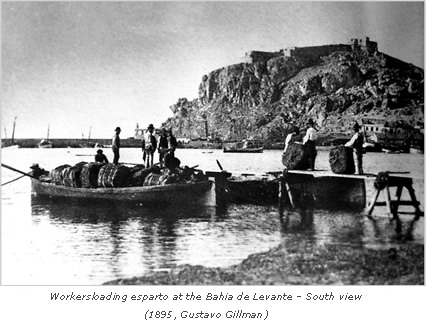 fermented in wells or freshwater pools, which tended to turn the esparto black.
The first company establishing its business in Aguilas was The Esparto Trading Company Limited, registered on October 22, 1868. The company’s directors were Lemuel Goddard and Philip Barron (British Vice-Consul in Almeria from 1869), who established the head office in London.
This company carried out all its trade operations through its branch commercial house, G. Noble and Co, which had its own commercial agent in Spain, in Cartagena.
The first board of directors was elected for a three year period and consisted of George Noble, Daniel Meinertzhagen and William Hope. The company's principal shareholders were George Noble, Philip Barron, and William Hope (each with 30 shares), and Robert Johnston. They lived in London, Almeria, Leith and Aguilas, respectively. Other shareholders of lesser importance were James Armstrong Murray, Daniel Meinertzhagen, Thomas Nowledge and George Loring (each with 4 shares), they resided in London, Cartagena, Durham and Malaga, respectively.
Robert Cheney Johnston, an Irishman born in 1822, moved to Aguilas around 1865 and became one of first and most important foreign agents for the esparto trade in Aguilas. He had his home and office at 13 and 15 Calle del Sol, respectively. This street, popularly known as Cuesta del Sol (Sun Slope), was noted for being preferred by the first British residents in Aguilas and was devoted to the business of ores and esparto. It offered a magnificent and strategic view of Levante’s harbour and its bay. The houses, with several floors and divided in rooms, were located on the southern slope of what was then called Cabezo de la Calica or de la Guardia, and it was a superb balcony directly over the sea.
On March 3rd 1866, Robert Cheney Johnston proposed to the owner, don Miguel Maria José Carvajal Tellez de Giron, Duke of Abrantes and Linares, Count of Aguilar, the signature of a working contract for an esparto estate named Villa of Cortes, in Baza.
Mr. Johnston was required to pay annually the sum of 25,000 reales, 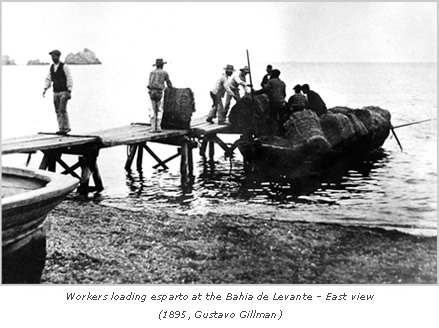 12,500 on 1st August and the rest at the end of November. The expenses of gathering and other expenditure were charged to the contractor.
Thus began the British presence in the esparto harvest, manufacture and trade in Aguilas, resulting several decades later in the railway.
Around 1870 most of the old lead foundries situated in the Playa del Bol became esparto warehouses. The construction of little wooden docks in front of them made the loading of the esparto bales easier, taking it to the ships out in the middle of the bay. Johnston was exporting esparto from Aguilas for The Esparto Trading Co. Ltd. until the company was dissolved on August 31, 1883.
Did this mean the end of the export of esparto from Aguilas?
Certainly not. The reason for dissolving the company was to absorb the Athorpe & Barker Company in January 1874, thus creating a bigger firm: The Esparto Fibre Company Limited.
The signature of a series of agreements showed the important economic and social potential of the companies involved in the new corporation, which indicated that they would have immediate repercussions in the increase and consolidation of the esparto trade in Aguilas.
The company which was dissolved, The Esparto Trading Company Limited, of which William Hope and Daniel McNaughton (both residents in Leith, Scotland) were its director and principal shareholders, contributed with the machinery and almost twenty esparto estates leased in Caravaca, Moratalla, Totana, Orce and Cúllar.
The principal shareholders of the company Athorpe & Barker were Frank Cowlin Barker, Charles Ernest Beaty Pownall and Alfredo Sauvalle y Gil de Avalle, (in those days all resident in Cartagena).
They signed an agreement for a renewable period of five years, to form part of the new company: The Esparto Fibre Company Limited.
Athorpe & Barker was founded on November 27, 1872 by the shareholders Marmaduke Fitzgibbon Athorpe, born in Dinnington, an esparto agent in Alicante, and Frank Cowlin Barker, who was the general manager of the company and had offices in Cartagena and Aguilas.
The company had as its first directors John Carolus Stirling, William Hope, Frank Cowlin Barker, Daniel McNaughton, Anthony Morris and Ernest A. de Paiva. This company maintained its name, even after its integration in The Esparto Fibre company Limited, until August 14 1884 when it was rescinded, MacLean and Hope being responsible for its liquidation. Some of its shareholders continued their work in another new company: The Esparto Trading Company Limited.
One of the principal shareholders of the old Athorpe & Barker company was the esparto agent Alfredo Sauvalle y Gil de Avalle, an important businessman and influential politician, born in Cuba.
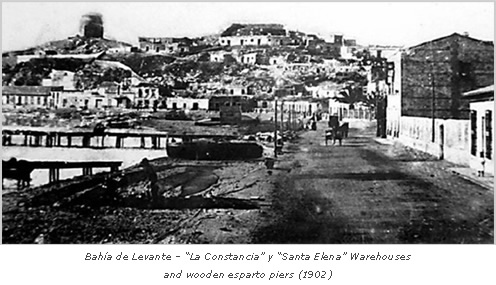 From January 1876, Alfredo Sauvalle would become the legal attorney in Aguilas for the newly founded The Esparto Fibre Company Limited.
His brother Jacobo, a retired military man, would also be an important esparto and mines agent in Aguilas, especially after the death of his brother Alfredo, in 1878.
The Esparto Fibre Company Limited was finally registered on January 9, 1874, being domiciled at offices in London.
The couple, Mr and Mrs Hawkes-Porta, lived in Aguilas some time, although their usual home was in Valencia. Howard Hawkes also worked in the iron ore trade and he was the owner of the mines Las Maravillas and La Pepita in El Garrobillo, among others. James Fischer Glover was his agent in Aguilas. Glover took up his residence in Aguilas around 1870, and he was one of the British men who left descendants in Aguilas from then to the present day.
The factory Santa Natalia would be transferred and sold in November 1882, by the figurehead José Moreno López, to another English esparto merchant, Albert Bishop Elford, who was born in Liskeard, Cornwall, in 1838. Mr. Elford lived in Orán (Algeria), because his company, Elford and Co. imported indistinct Algerian and Spanish esparto.
Another important esparto merchant, settled in Aguilas at the end of the 19th century, was the Scot Alexander Malcolm, born in 1850 at Kenmore, Wandsworth Common, who married Gertrude Butterfield, born in Camberwell, on September 1st 1881 .
On November 9th 1888, Alexander Malcolm together with the shipping agent James Bernard Heywood (born in Sheffield in 1854 and married to Dolores Moreno, from Madrid, both residents in Cartagena from 1878, at 26, Cuatro Santos) founded in Cartagena, the Society Malcolm & Heywood, dedicated to “ the business of purchase and sale of esparto”, thus supporting the commercial and maritime link between Cartagena and Aguilas.
Another important esparto agent of this company, living in Aguilas at that time, was Maximiliam Doodt Jacobsen. He was Prussian, born in Danzig, and was married to Josefa Cabrera Barberán, daughter of Ramón Cabrera, a man from Lorca dedicated to the mining business in Aguilas.
At that time a new and important esparto merchant arrived to Aguilas giving a new impulse to the esparto business: William Barber McMurray.
MacMurray was born in Glasgow in 1807. From 1847 he had gained great experience in the manufacture of paper fibre in his mills in Esher, Surrey.
On December 2, 1891, the company MacMurray's Royal Paper Mills Limited, was registered, with the purpose of ensuring the supply of esparto fibre for the new factory situated in Wandsworth, Surrey. The company established its head offices at South Street in Wandsworth and its board of directors and main shareholders were James MacMurray, Ellis Whittaker, Frank Green, J. Vezey Strong, William M. Intcher, John King Kenmore and J. H. Leworthy Caerdon.
For that work, the elderly and single MacMurray always had the assistance of his nephews, the MacFarlanes.
In 1905 two of his nephews, John MacFarlane and William MacFarlane, appeared as shareholders of MacMurray Royal Paper Mills Co. Ltd. William was the owner of a newspaper in Wandsworth.
MacMurray earlier sent two other nephews, David and George, to Aguilas and Cartagena, in order to ensure the quality of the raw material for the manufacture of the paper.
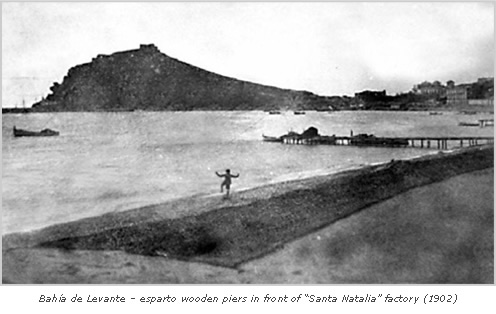 In Aguilas the esparto was stored and supervised for shipping by David McFarlane MacMurray, an unmarried man twenty four years old. He was responsible for accomplishing the purchase, in October 1877, of the emblematic esparto factory which was constructed by Frederick Howard Hawkes, Santa Natalia, in front of the present day Club Náutico on the Playa de Levante.
In Cartagena George Mac Farlane began to supervise the esparto. He was thirty years old and was married to Margaret Anne Stewart (in Perth, Scotland, November 10, 1871). The couple moved to Aguilas in 1880. Before that, MacMurray's agent in Aguilas had been Owen Dickins Wright, married to Jessy E. Barnett. They lived at the factory from 1878.
MacMurray 's Royal Paper Mills Limited continued its activity until August 15, 1930 when the dissolution of the company was requested.
At the beginning of the 20th century, Norman MacColl MacLean, another Scot, born in Glasgow on March 5 1860, had taken over from the last of the principal British esparto merchants in Aguilas.
MacLean was married to Jessie Stephens, born in Birkenhead, and he became a very respectable and influential man in local business. He must have arrived in town in the 80’s, since he was designated pro-consul in Aguilas on March 21 1889, as an assistant of the vice-consul Thomas Hillary Naftel.
In 1894, when he was 34 years old, MacLean appears in the municipal census as an agent of the esparto trading company M de Levy and sons, becoming at once president and principal shareholder of Puttfarken & Norman, whose factory and esparto warehouse was located at the Playa del Bol.
At first, MacLean lived in a solitary house, named Miramar, situated at the top of a mountain at the Hornillo Beach. Later, he transferred his residence to the consular office at the Plaza de la Constitución, where most of the children the marriage were born: Marjorie, Sheila, Kenneth Stephens, Elspeth and Fitzroy Donald.
In 1902, he bought the plots of land between the railway station and the beach, where he built a beautiful house of two levels (one of the few houses of English style which were maintained in good condition in Águilas until a few months ago). The house adjoined his two esparto factories and the warehouses in his ownership, La Constancia and Santa Elena. In front of them there were two little wooden piers from which he carried out the operation of loading esparto into steamships anchored out in the Bahia de Levante. All the buildings were situated at the side of what nowadays is the Club Náutico of Aguilas.
One of the most popular characters of the more recent esparto business in Aguilas was the Scot John Watson Gray.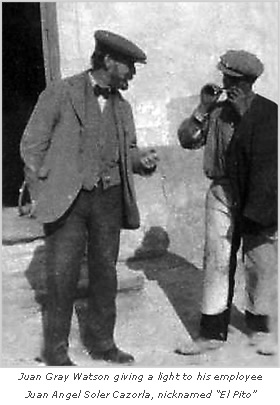
Probably, Juan Gray, as he liked to be named and as he signed the documents, was born in Aberdeen, in 1862. He came to Aguilas around 1890, appearing in the municipal census as a habitual resident in the village in 1892.
He was married to Mary Eugene Smith, and they did not have any children.
He worked as an esparto merchant associated with the Scot Alexander Malcolm and with Raimundo Ruano Blázquez, from whom he bought one of his most important esparto factories, the so-called Virgen del Pilar at Bahía de Levante, in 1904. Renamed La Motivadora.
In June, 1902, Gray founded the company Juan Gray y Compañía which was registered in Murcia in May 1904. The purpose of the company was banking business and branch offices were opened in Aguilas, Lorca and Cuevas de Almanzora.
The company was formed by the following associates:
 John Gray (Watson), John Gray (Watson), previously a resident in Aberdeen at Branchard, Juniper Green.
 Arthur Borthwick Arthur Borthwick, previously a resident at 35, Palmerston Place, Edinburgh.
 Hughs Pakenham Borthwick Hughs Pakenham Borthwick, previously a resident in 35, Palmerston Place, Edinburgh.
Although Gray contributed 2,000 British pounds and the brothers Arthur and Hugh 5,000 pounds each, the statutes showed that the shareholders would share in identical profits and losses.
The best friend and partner of Juan Gray was Hugh Borthwick, to whom he sold, in 1904, the Isla del Fraile, which Gray had purchased in a public state auction in December 1899, paying one hundred and ninety pesetas. This sale stirred up a great turmoil in public opinion, most of all for the editorial written by the provocative local journalist and poet José Martínez Parra, who wrote for the national newspaper La Correspondencia de España, treating the subject as a second Gibraltar .
Juan Gray was an affable, large-personality man with an extraordinary elegance. Clothed in an outlandish green-coloured suit and with the aid of his cane he took long walks in all the surroundings of Aguilas.
His initial prosperity in business and his fondness for cultural, social and sporting events (he was fond of hunting) was crucial in making his more valued and unforgettable legacy to this beautiful harbour town, the creation of one of the first football teams in Spain.
Taking pride in his origins (do not forget that the Scottish were the first people who played football) he organised matches near his factory, teaching the rules of the game and training some of his employees
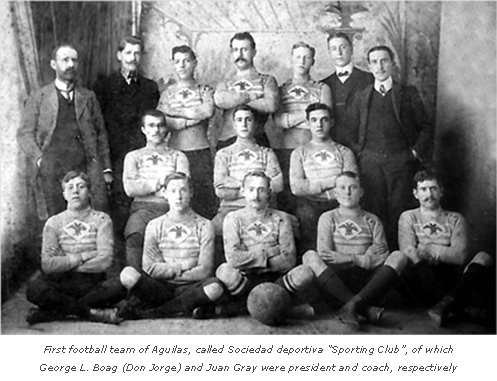 Together with the director of the Railway Lorca Baza Aguilas, George Lee Boag (honorary President) he founded the “Sociedad Deportiva” (Sporting Club), and became its President. These two British men, along with Norman MacLean, were the main shareholders of the sporting club with 5 shares, 15 shares and 3 shares respectively. The rest of the associates were people from Aguilas who were linked to the British colony: Pedro Calero Luanco (Vice President, 1 share), Salvador García Cortés (accountant, 1 share), Joaquín López Morales (Secretary, 1 share), Mr. Juan Romera Periago (Treasurer, 1 share), Juan Larrea Carmona (Member, 2 shares) and Manuel Larrea Carmona (Member, 1 share).
Gray grouped and trained British and local players organising a soccer team that would be a magnificent and unbeatable one.
As an outstanding naturalist, he demonstrated many times his love and appreciation for the fauna and flora of our land, which caused him to purchase small animals, fossils and local plants. Who knows whether he was making a special collection or whether he wanted them to send to a Scottish colleague.
As an active scout, an expert in Baden-Powell’s scouting philosophy, Gray furthered the contacts with the scout group in Cartagena which culminated in the foundation of the Tropa de Exploradores de Águilas on February 7 1914. This he did with his fellow citizen of Aguilas, the engineer and rolling stock Head of the railway Company Sidney Ogilvie Browne (known as Juan Browne in the village). In July 1917 Gray was elected a member of the association, becoming President in July 1919.
John Gray Watson and his wife lived in Aguilas until one fine day they disappeared forever, without leaving a trace.
What a great aguileño this Scot!
 Aguilas and the mining Aguilas and the mining
During the Napoleonic occupation (1796-1808), French and Belgian companies held the exclusive rights to exploit the mines in Spanish territory. But the War of Independence (1808-1812) permitted the arrival of other foreign companies, especially British, German and Danish.
In 1825 the first mining code was promulgated, included in the Law published on July 4, 1825, known as Ley de El Huyar. This liberalised the mining operations, authorising on one hand the acquisition of small properties for exploitation, and permitting on the other hand export and commercialisation by foreign companies.
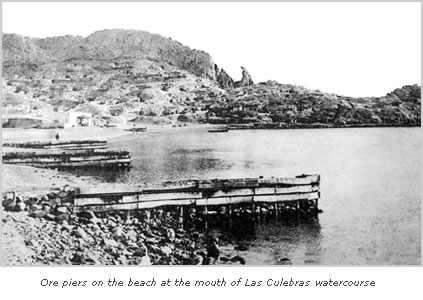
In 1826 the Junta de Minas was reorganised and renamed Dirección General de Minas; in 1833 the Real Cuerpo de Ingenieros de Minas was founded and in 1835 the Subdelegaciones de Fomento was formed to negotiate everything about concessions, records, demarcations and inspection of mines.
The activation of mining in the Spanish Southeast started at this time, around 1830, with the exploitation of slag heaps and abandoned lead mines ( galena argentífera), as would happen in Sierra de Gádor and later in Sierra de Almagrera, both in the province of Almería.
The liberalisation of the exploitation of the veins from 1827, motivated the establishment of a metallurgy parallel to the extraction. This was the speciality of obtaining unprocessed lead which was exported in rod-shaped form to French and British markets.
This metallurgic activity began in the mountain range in the form of small foundries called boliches. These furnaces or stoves initiated the activity using the esparto and trees of the surrounding areas as fuel. But on March 4 1832, a royal order established the franchise for exporting coal, also regulating foreign imports and domestic trade.
This led to the construction of big foundries at inlets and beaches on the Almería and Murcia coast, where it was easier to deposit coal unloaded from the vessels for the foundries and where the ore brought down from the mountain ranges was destined to be smelted.
In 1840, there were 5 foundries in Almería and Adra, 12 foundries in Cuevas and Vera, 4 in Aguilas, 1 in Mazarrón, and 2 in Cartagena.
Aguilas foundries profited most from lead from the Sierra de Almagrera.
We can see in this comparative table the silver production (in German marks) in the Spanish Levante during the first four months of 1848:
|
 Almagrera: Almagrera:
| |
Fundición “Carmelita” de Cuevas
Fundición “Concepción” de Vera
Fundición “Encarnación” de Cuevas
Fundición “Tres Amigos” de Vera
|
7.521 marks
2.262 marks
3.545 marks
1.413 marks |
| TOTAL 14.741 marks |
 Águilas: Águilas:
| |
Fundición “Iberia” de Águilas
Fundición “San José” de Águilas
Fundición “Unión” de Águilas
Fundición “Virgen del Pilar” de Águilas |
458 marks
4.071 marks
3.151 marks
2.010 marks |
| TOTAL 9.690 marks |
 Cartagena: Cartagena:
| |
Fundición “Orcelitana” de Cartagena
Fundición “San Isidro” de Cartagena
Fundición “San Jorge” de Cartagena
|
362 marks
3.151 marks
2.010 marks |
| TOTAL 3.413 marks |
|
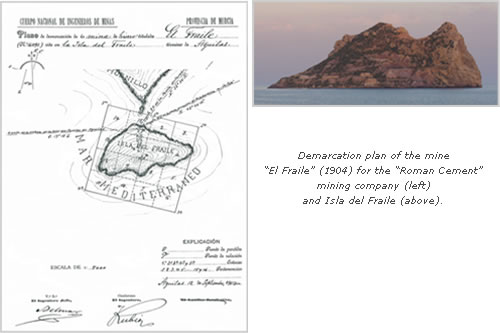 |
Meanwhile the Berja Mining District Head office, opened in 1835, covering the provinces of Granada and Almería, had to be moved to Adra, in view of the real mining fever which had seized the region from 1839. But Adra was not able to cope with so many applications for registration. On November 27, 1840 a royal order established a new Mining District Head office in Aguilas, covering the Sierra de Almagrera and the province of Murcia.
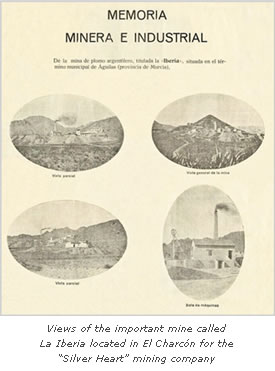 The following year, for no apparent reason, this head office was moved to Lorca, but the inconvenience of the location would, in 1846, trigger royal order to move it back to Aguilas. There it would remain a decade longer, until it would be definitively moved to Murcia in 1856.
Therefore, if Aguilas had begun its prominence in the contemporary mining and metallurgic setting in 1930, it became now, in 1840, the head of the most important mining district in Spain.
The closing of French harbours because of the revolution of 1848, the protests of the Almería and Murcia miners about the loss of profits in working the mines and the complaints of national smelters about the high costs of fuel for the furnaces, would initiate the lead crisis.The foundries Union and Constancia, located at the Playa del Bol, at Levante's Bay, stopped working in 1851, according to reports by Anselmo Sánchez Tirado in his “Memoria sobre el estado de la minería en la provincia de Murcia durante el año de 1859” (published in 1862); and the foundry Virgen del Pilar (also at Levante Bay), and the San Jose and the Iberia (in the West), would do so a few years later. The lead desilvering had ceased to be profitable and the foundries started to close.
Spain, after the colonial crisis in 1898, had not yet initiated the Industrial Revolution as other European nations already had done led by Great Britain. The lack of stimuli for investment of the Spanish bourgeoisie and leading social classes, with no capitalist mentality (as they tried to live from the rents or the acquisition of confiscated goods that generated quick benefits) they did not want dare any risk of their capital in partial or industrial projects, such as mining explotations or railway construction. In any case, still there were not in Spain an extended and sufficient legislation that boost or encourage the investment in these scopes.
The lack of infrastructure delayed the longed yearned industrial development of our country. With the General Law of Highways in 1851 and General Law of Railways in 1855, Spain began to adopt the necessary decissions that it would favour the investment, although good part of the capital would be foreign, mainly French and British.
Already in 1815, the English products had foreshadowed their western market of expansion in Latin America, reason why all the British foreign policy will aim towards that transatlantic purpose.
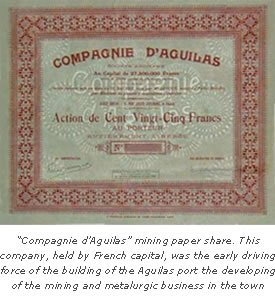 In 1872 the low production of the rich mines of the Jaroso and the high costs caused by the drainage of water from the veins caused the seizure and the transfer of the Sociedad anónima de plomos argentíferos de Almagro y Almagrera by its main creditor, the Sociedad Minera de las Sierras de Almagro y Almagrera, changing the name to the Sociedad Minera de Sierra de Almagrera. It was founded on February 28 1875 in Paris, its principal shareholder being Luis Figuera y Silvela, a mining engineer, senator and influential Spanish businessman.
Mr. Figuera founded on July 30, 1879 with Georges August Edouard Le Roy, the company named Figuera Le Roy y Compañía, Societé des Mines et Usines d’Águilas. Shortly after, on March 22 1879 he obtained the concession for the 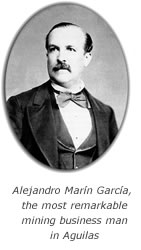 improvement works of Aguilas harbour. These works were, for this engineer, the very first brick of a personal and ambitious project that would try to tie the mining-metallurgical complex of Sierra de Almagrera with our coastal village via a narrow-gauge railway.
On July 30 1879, Figuera Silvela himself founded the Compañía del Puerto de Águilas well-known in the future with the abbreviated name of Compañía de Aguilas.
The Compañía de Aguilas would have an important and powerful presence in the exploitation and benefit of mines in Bédar, Águilas and Mazarrón.
In Aguilas, Silvela took over in 1884 the foundry Iberia which became, along with the Franco-Española in Cartagena, one of the two biggest foundries of the province of Murcia in the 1880s.
The principal operation of the Compañía de Águilas was known as El Socavón de Pinilla, (the Pinilla excavation). On the other side of this impressive mountain, in Cuesta de Gos, it was another company with British capital, the Reyna Mining which would open its galleries entering into direct competition with the Compañía de Aguilas.
British mining in the Southeast of Spain
The British investment had arrived to Spain in the middle of the 19th century as an answer to the incapacity of the Basque iron and steel industry to confront the construction of railways as complement for its exploitation, which later will facilitate the development of the iron mining.
At the same time, several British iron and steel companies were settled in the North of Spain: Orconera Iron Co. Ltd, Somorrostro Iron Co. Ltd, Bilbao Iron Ore Co. Ltd, Luchana Mining Co. and the Parcochea Iron Co.
The total of the British investments in the mining district of Bilbao between 1871 and 1875 was 4,519,724 pounds (112,993,100 pesetas). Most of this quantity carried out the construction of railways and piers adapted to the transport and iron ore loading operations. In all these companies joined important Bilbao ’s businessmen (Ybarra or Chávarri) and British (MacLennan, MacLeod, Levyson, etc).
In 1860 the Lagunazo Sulfur and Copper Company Ltd. was founded in London, turned in 1866 in Glasgow into the Tharsis Sulfur and Copper Mines Co. Ltd. for the exploitation of the copper mineral in Huelva, which was the starting signal for English and Scottish companies to obtain concessions for the mining operation in our country, that until then it had been mainly in hands of French and Belgian companies. The presence of British companies in Linares and Río tinto (Huelva), would cause that the geologic and mining prospections moved towards the peninsular East in search of new menas.
In 1875 British mining agents were operating in Sierra del Aguilón, in Sierra de Enmedio or Cuesta de Gos. From this year onward the presence of a British colony in Águilas appear associated to esparto, mining and railway affairs.
Around 1870 a number of foreign mining ore merchants and mining agents arrived in Cartagena, they were going to address the lead crisis. This together with the cantonal revolution of 1873 established the basis of what would be the exploitation of new ore in the following years.
Richard William Barrington, born in Ireland in 1832, who first lived in Águilas and later in Cartagena, was associated with Francis H. Leathley Holt, founding the emblematic company Barrington & Holt for the purpose of purchase and exploitation of mines and trading in any kind of ores.
Julio C. Daglish Walker, born in Newcastle in 1838, was a single man who arrived in Cartagena in 1870 and was associated on numerous occasions with the merchant Juan Jorquera Martínez, from Cartagena, buying and selling ores.
Bernard Heywood, born in Sheffield on May 25 1854, was another important mining merchant and shipping agent. He reached Cartagena in 1879, whre on November 9 1888, he founded the Society Malcolm and Heywood in Cartagena, with his financial partner Alexander Malcolm. The Society was dedicated to “ the business of purchase and sale of esparto, commissions, consignments, and transits of these goods”. Alexander Malcolm was born in 1850 at Kenmore, Wandsworth Common and was married to Gertrude Butterfield, they lived in Aguilas.
 Joseph Bowron Moss
Joseph Bowron Moss, William Stephen Orchardson and John Clark Gray, whose turnover led to the establishment of societies for the exploitation of iron mines in the parish of Perin.
John Clark Gray was born in Aberdeen in 1846. He moved to Cartagena around 1874, as a mining and esparto agent. He was associated with the newly elected English vice-consul at Cartagena, William Davidson Milvain and on January 8, 1877 they founded the Gray and Milvain Company Limited for “ shipping, brokerage and consignments of ships” in Cartagena.
William Davidson Milvain, was born in Newcastle on Tyne in 1846. He had served as British Viceconsul in Aguilas from 1869 to 1874. His predecessor, the British consul in Cartagena, Edmund J. Turner - one of the most active around the Mediterranean - had requested a transfer to the Coruña Consulate days before the start of the Cantonal Revolution. The British vice-consul in Aguilas, William Milvain, who held the post from 1869, was quick to request the vacancy himself.
William Milvain's death on January 18 1895, left vacant a much desired post. John Gray requested it in his own right, because he had been assisting Milvain as a proconsul from June 30 1891. His application was in competition with that of Thomas Hilary Naftel, who had been British vice-consul in Aguilas since May 23 1874. In the end the vice-consul post was covered by John Clark Gray in 1895.
But when was the start of the British presence linked to the mining operation in Aguilas?
British mining companies in Aguilas
On July 28 1889, the newspaper Diario de Murcia published an extract of the Report read before the English Association for Iron Trade, in which it said that “The mines of the South of Spain could be divided in 7 groups, that is to say:
1. Cartagena y Portman,
2. Parazuelos,
3. Águilas,
4. Garrucha y Bédar,
5. Almería,
6. Málaga y Marbella y
7. Calasparra y Cehegín.
(…) Of the 7 districts mentioned, Aguilas is considered the most promising, because the district to be exploited in the Sierra de Enmedio which is 9 miles from Aguilas contains the most surprising veins in the surface which have never before been seen in Spain, not excepting the mines of Somorrostro. Tests on these ores show they contain 51 percent iron, 0.12 of phosphate and 1 percent of silica. The price could be 15 per ton and a railway to the port would cost little because the route is not hilly.
The opinion of the speaker was that it was necessary that a railway, now under construction, would pass through Sierra de Enmedio. Their mines have the great advantage of having Aguilas a top quality port, where ships of any draught can be loaded protected from the wind. (…)
Shipping costs. Mr. Smith also exposed concerns that shipping costs were higher in the South of Spain that in Bilbao because of the longer distance. He could assure however that for many years he had chartered in the South of Spain and Bilbao and that the costs in the ports of Cartagena, Águilas and Almeria had been lower. Nominally they appeared higher, but since thousands of ships went to the South loaded with coal, by using return journeys the costs were reduced”.
Still today we can listen to octogenarian residents of Cuesta de Gos, pronouncing vehemently and with an aguileño accent the words “ la reina miní”, in relation to the name of the first British company which initiated the first large-scale mining works in Aguilas: La Reyna Mining. In this very beautiful and charming place, still safe from property speculation, were born and lived many generations of miners, who suffered, I have to say, hard conditions of working and living. These conditions which are nowadays unacceptable surely forged the character of these people in an indelible way. As everybody knows, Paco Rabal, the immortal and universal aguileño actor, was the son of a miner from la Cuesta de Gos.
Although there had already been several British mining agents in Aguilas, such as Thomas Frederick Howard Hawkes, Owen Dickins Wright and James Glover Fisher, the first mining company established in the village as such, was The Reyna Mining Company Limited.
In July 1880, the young mining engineer Percival Broadbent Fowler, then 25 years old, started the first purchase of mines in the area, also obtaining the exploitation rights of others. The most important leasing contract was for the mine named San Bartolomé, of 41,929 square metres, where they began the excavation of its principal gallery.The Reyna Mining Company Limited was registered in November 1880 and its head office address was at 2 Queen Square Place in London. The board of directors was formed by:
 Edward Woods, engineer, 66 years old, resident in London Edward Woods, engineer, 66 years old, resident in London
 Richard Peacok Richard Peacok
 Henry Nelson. Henry Nelson. |
 Charles Wetherell Wardle, engineer, 59 years old, resident in Leeds Charles Wetherell Wardle, engineer, 59 years old, resident in Leeds
 John Fraser John Fraser |
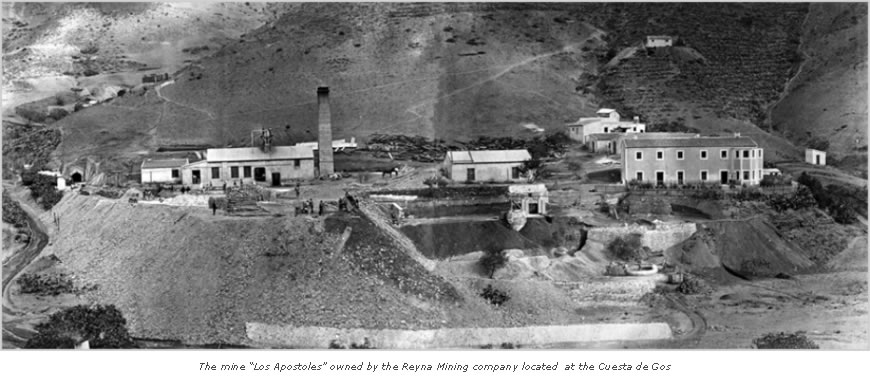
The first company president was one of its main shareholders, the influential engineer and British architect John Fowler and the first secretary of the company was James Danford Baldry, 72 years old and resident in London.
Baldry was an experienced engineer who worked on the construction and maintenance of the East Lincolnshire Railway.
From 1853, Baldry took part in the construction of the Oxford, Worcester and Wolverhampton Railway, as a member of Fowler's team, with whom from 1881, he collaborated in important railway engineering works, the construction of the Severn Valley Railway, the Craven Arms-Much Wenlock Railway, the Coalbrookdale branch and the Isle of Wight Railway. From the same year he was involved in mining business in association with Fowler.
By agreement of the Junta, on September 20, 1880, the Reyna Mining Company Limited gave power of attorney in Aguilas and Spain to Percival Broadbent Fowler, John Fowler’s son.The Reyna Mining Co. Ltd. was registered in Great Britain on January 11, 1886, establishing its nominal capital at £50,000 divided into 5,000 shares of 10 pounds each. At that time, the board of directors had decreased considerably, showing more Scottish shareholders than English:
 Richard Peacock, mechanical engineer, of Manchester Richard Peacock, mechanical engineer, of Manchester
 John Fowler, English civil engineer John Fowler, English civil engineer |
 William Pilckington, glass manufacturer, of Liverpool William Pilckington, glass manufacturer, of Liverpool |
At that time, the Secretary was Samuel Morgan.
At first, the operations director was the veteran English civil engineer James Danford Baldry, who probably lived at la Cuesta de Gos.
Percival Broadbent Fowler was the assistant mining operations engineer to the veteran engineer Edward Woods, who would also later be a shareholder of the British company of the Murcia to Granada railway. Both worked in situ as company managers.
Employing the experienced esparto and mining agent, James Glover Fisher, who had lived in Aguilas for many years, the first mines that the company acquired were the Martica in Umbria de Lomo de Bas in the parish of the Barranco de los Asensios and the Juanita at Barranco de Pinilla in the parish of Garrobillo.
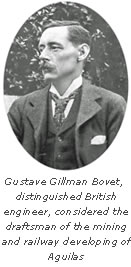 In August 1883 the British engineer Gustave Bovet Gillman came to Águilas, to Cuesta de Gos. He was appointed by Percival Fowler as director of drilling at Socavón of la Reina, an important subterranean gallery of several kilometres which had been started in 1881 and which crossed the Eloína and San Bartolomé mines. Gillman was responsible for the operation until the spring of 1888, when he was hired as engineer for the construction works of the railway.
Gillman was replaced in 1888 by the mining engineer Thomas Frederick Polglaze Hosking, from St. Blazey (Cornwall), who also lived at Casa Grande, in Cuesta de Gos. Hosking had as an attorney a very important businessman, the mining agent Anselmo Bañón Martínez, from Murcia.
Another British mining company well known by everyone in Aguilas, was The Bacares Iron Ore Mines Limited, that was Scottish owned. Its name became very popular at the town as years went by, although the ore extracted came from mines situated in the Serón municipality (Almería) and some others, very few, in the Aguilas municipality.
The Company The Bacares iron Ore Mines Limited was registered on May 24, 1899, in Glasgow, and was a result of the purchase of another one of Belgian nationality, called Bacares Almeria & extensions, Compagnie des Mines, founded in 1887 by Conde de Caserta, and whose first intention was to construct a mining railway from Serón to Almería crossing the Sierra de los Filabres.
The stock capital of The Bacares Iron Ore Mines Limited was £175,000, divided in 12,500 shares of £10 each. The principal shareholders were:
 John Charles Cuningham, resident in Glasgow,Iiron master. John Charles Cuningham, resident in Glasgow,Iiron master.
 Peter MacDonald, resident in Greenholm, Langloan, Coatbridge, Secretary. Peter MacDonald, resident in Greenholm, Langloan, Coatbridge, Secretary.
 John Sutherland, resident in Lochwiver, Dumbett Avenue, Coatbridge, Accountant. John Sutherland, resident in Lochwiver, Dumbett Avenue, Coatbridge, Accountant.
 Robert Allan, resident in Tinto View, Uddingston, Administrator of a coal merchant. Robert Allan, resident in Tinto View, Uddingston, Administrator of a coal merchant.
 William Brotchie, resident Crosshill, Glasgow, Delegated Secretary. William Brotchie, resident Crosshill, Glasgow, Delegated Secretary.
 James Mackintosh, resident in Glasgow, Secretary. James Mackintosh, resident in Glasgow, Secretary.
 Frederick Gordon Mackillop, resident in Glasgow, Procuratory. Frederick Gordon Mackillop, resident in Glasgow, Procuratory. |
The new Scottish company established its offices in Aguilas, under the umbrella of the railway project from Murcia to Granada.
The director of the railway company in Aguilas, at that time, Gustavo Gillman, produced an excellent study showing the profitability of the exploitation of the mines at Sierra de Bacares. He suggested the construction of an aerial cable between the mines in the Sierra de Bacares and Seron railway station.
In this way, Gillman became a representative of The Bacares Iron Ore Co. Ltd, The Great Southern of Spain Railway Co. Ltd, (known in Spanish as Compañía Ferroviaria de Lorca a Baza y Águilas) and The Hornillo Co. Ltd. as a perfect complement of mining operations.

With the Royal Order on November 12, 1092, the Government authorised the construction of two lines of aerial cableway: Manzano and Cortijuelo. The cable way of Manzano, around 14 kilometers in total, had three branches: one to the hoppers of Los Leones and Buenavista; another to the hoppers Pastora and Menas; and a third to the hopper Santa Catalina. The Cable way Cortijuelo, of around 14 kilometers also, had two branches: one to the hopper Menas, and another to the hopper San Ignacio and Francia.
In spite of the fact that the mining exploitation had started well, the Bacares Company owed benefits to the shareholders, and in order to alleviate this situation, on February 21, 1905, power of attorney was granted to the engineer Robert Graham Ewer, then 38 years old and resident in Aguilas, and to the lawyer and notary Enrique Borrel Mateo, resident in Madrid. These powers of attorney were given also to the lawyer Isidoro de la Cierva Peñafiel, in Murcia, on August 4, 1905.
It will not be until 1908 when the company began large-scale mining operations. Managed then by Noel Christian Livingstone Learmonth, resident in Gillingham (Dorset), his agent in Spain, living in Serón was the mine director, the iron master John Charles Cunningham, from Glasgow. Later it was Archibald Russel, while the director engineer of operations was the engineer Rafael Marín García, from Aguilas.
In December 1918 a new company was created under the name of Bacares-Seron Ropeways Limited at 32, 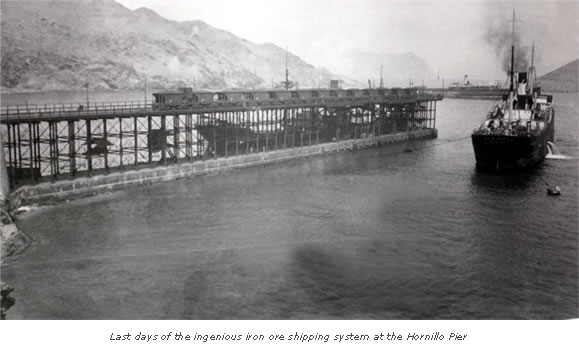 Victoria Street, London. 19,993 shares of the Bacares Iron Ore Mines Limited were transferred to the new company. The managers of the company werethe Scots, Baron Sir Faber Edward Johnson Ferguson and Louis Gardiner Paerson (probably Pearson or Peterson), both residents in Springkell and The Linn, Johnstone, respectively. The rest of the shareholders had also a Scottish origin, distributed between Newmains (Lanarkshire), Glasgow and Leeds.
In April 1920 the Company transferred its business address to Almeria.
The businesses of the company did not go well, because in August 1929 the British High Court of Justice authorised a reduction of the capital, passing from £135,000 (divided in 13,500 shares of £8 each one) to £108,000 BP (divided in 13.500 shares of 10 pounds each one). In January 1930 a new order confirmed a capital reduction, for the purpose of paying the numerous debts that the company had been accumulating.
 Aguilas and Railway Aguilas and Railway
The British investment arrived to Spain in the middle of the 19th century as an answer to the incapacity of the Basque iron and steel industry to confront the construction of railways as complement for its exploitation, which later will facilitate the development of the iron mining.
At the same time, several British iron and steel companies were settled in the North of Spain: Orconera Iron Co. Ltd, Bilbao Iron Ore Co. Ltd, Luchana Mining Co. and the Parcochea Iron Co in competitive with Societé Franco-Belga des mines de Somorrostro.
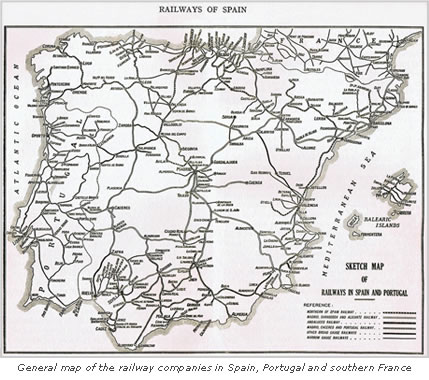
The total of the British investments in the mining district of Bilbao between 1871 and 1875 was 4,519,724 pounds (112,993,100 pesetas). Most of this quantity carried out the construction of railways and piers adapted to the transport and iron ore loading operations.
In all these companies joined important Bilbao’s businessmen (Ybarra or Chávarri) and British (MacLennan, MacLeod, Levyson, etc).
Do not forget that the first concessionaire of the railway from Murcia to Granada and a branch to Águilas, Edmund Sykes Hett, had business in Brazil and later in Bilbao before bringing the railway to Águilas.
But there were also other British companies that constructed railways for transporting other goods, like the railway from Alar del Rey to Santander (1852-1857) or the West Galicia Railway (1886-1899). In both cases, the Company of James Levyson was involved, that later would be in charge for designing the Hornillo Pier under the supervision of Gustave Gillman, to whom the company will hire later for its works in Brazil.
In 1860 the Lagunazo Sulfur and Copper Company Ltd. was founded in London, turned in 1866 in Glasgow into the Tharsis Sulfur and Copper Mines Co. Ltd. for the exploitation of the copper mineral in Huelva. The presence of British companies in Linares and Río Tinto (Huelva), would cause that the geologic and mining prospections moved towards the peninsular East in search of new menas.
In 1875 British mining agents were operating in Sierra del Aguilón, in Sierra de Enmedio or Cuesta de Gos. From this year onward the presence of a British colony in Águilas appear associated to esparto, mining and railway affairs.
Railway for Aguilas
On March 16 1882, the Ministry of Public Works granted to the Compañía del Puerto de Águilas the concession of a narrow-gauge railway which, starting from Aguilas, would fork at Puerto de Grima into two branches, one towards Sierra Almagrera and the other towards Lorca.
On October 25 1882, Jacinto Alcaraz Carcaño, as the representative of Felix Parent, general manager of the “Compañía de Aguilas”, the French company concessionaire of the project, solemnly took minutes about the works which had been established at the place named El Rubial in the parish of Cocón, for the construction of a narrow-gauge railway in the direction of the Port of Grima, where it would branch off towards Lorca and Sierra Almagrera. The engineer director of the works was Alfredo Coullant Boutecille, who at the head of sundry employees and foremen and under the watchful eye of local authorities and Aguilas citizens, began tasks of land levelling, thus inaugurating the first works of a railway project which would never be finished.
At that time another much more ambitious railway projects, which also included Lorca in its itinerary, was already being spread by word of mouth: the railway from Murcia to Granada.
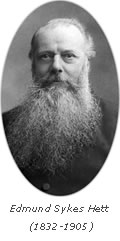 Edmund Sykes Hett Edmund Sykes Hett was undoubtedly one of the principal architects of the arrival of the railway in Aguilas and its consequent social and economic development.
Hett saw in Spain the country with the most future in the construction of mining railways, the reason why he made several trips throughout our geography to study the mining areas with the most potential.
It was in Bilbao and Santander that he joined several construction projects of railways and piers for coal and iron ore.
At that time Hett had moved to Leighton, near Neston (Cheshire) and had two daughters and three sons. Although at that time he was already a retired merchant, he continued to be active in business.
The British engineer Gérard Philip Torrens was from June of 1879 in Cartagena as manager of the recently created The Carthagena & Herrerías Steam Tramways Company Limited. The mentioned company intended to construct and to operate a mining railway from the Rincón de San Ginés to Cartagena. This was one of the first projects of mining railways in Spanish Levant. Torrens spoke perfectly Spanish, and he became the most important adviser at that time in the matter of railway engineering in the South of Spain. During his residence in our country, he became more aware of the great potential that would have the construction of railway branches that checked out and dragged the minerals from the rich range mountains of Almería and Granada. Torrens was one of the main partners of Maurice Levyshon, who had mining business in Bilbao and esparto trade in Cartagena. Levyshon had been general manager fo the Union Bank of Sapin and England Ltd.
In March 1884 the regional press picked up news of the presence of Hett in Spain accompanied by George Higgin Winfield.
On November 17 1884, a Royal Order approved the schedule of terms and conditions for the concession of the construction of a railway from Murcia to Granada via Lorca. The concession would become effective if, during the period of 15 days following the publication in the Gaceta de Madrid, the sum of 2,869,660 pesetas was deposited at the Caja General de Depósitos. On November 24 1884 a Royal Order announced the auction, on March 7 of the following year, of the railway from Murcia to Granada via Lorca. According to the newspapers, the auction was attended by the important businessman in the field of railway construction, Jorge Loring, as a representative of the important British railway construction company Hett, Maylor Co. Ltd, whose main shareholder was Hett.
On March, 7 1885 a public auction of the Murcia to Granada railway project was held and on March 12 the construction project was awarded to the only bidder, Edmund Hett. By Royal Order of March 12 1885, the Spanish Government granted him the concession for the implementation within three years, of the proposed work.
In March 1885 the newspapers also reported the presence of Hett in our region and the opening of the head offices of the railway company in Lorca.
Finally, on May 24 1885, Hett took control of the concession of the railway from Murcia to Granada through Lorca.
Hett, as a good mineral and coal merchant, knew the great potential of a branch from the main line from Murcia to Granada that would go from a Junction (first located in Pulpí, later in Almendricos) to Aguilas. For this reason he applied at the same time for the construction of a mineral pier at El Hornillo bay, where there was already a small harbour.
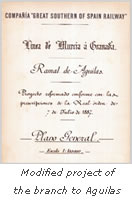 |
Once the outlines of action and development of the project were established, Hett travelled to London with the concession guaranteed and on June 10 1885 he constituted the Hett, Maylor & Company Limited with a nominal capital of £250,000 divided into 2,500 stocks of 100 pounds each. The company shareholders were mainly merchants and engineers, most of them relatives:
 David Cooper Scott, merchant David Cooper Scott, merchant
 Henry Herbert Hett, merchant Henry Herbert Hett, merchant
 Thomas Alexander Yarrow, merchant Thomas Alexander Yarrow, merchant
 John Maylor, engineer John Maylor, engineer
 Robert Mercer, engineer Robert Mercer, engineer |
 Edmund Sykes Hett, merchant Edmund Sykes Hett, merchant
 Frederick John Yarrow, merchant Frederick John Yarrow, merchant
 Thomas Nicoll Leighton, merchant Thomas Nicoll Leighton, merchant
 Alfred Fernández Yarrow, engineer Alfred Fernández Yarrow, engineer
 Jeffrey Inglis Leighton, merchant Jeffrey Inglis Leighton, merchant |
|
More than half of the shares in the company belonged to the first four gentlemen.
Meanwhile in Spain on June 8 1885, the Ministry of Public Works authorised the transfer of the concession for the Lorca to Aguilas railway from Francisco de la Guardia y Durante to Roberto Roberts y Parry, a Welsh civil engineer with temporary residence in Madrid. In September 1885 Hett authorised a major land acquisition in Aguilas.
But on October 24, 1885 was registered in London other company with the name of “ The Great Southern of Spain Railway Company Limited”, that it means in Spanish “La Gran Compañía de ferrocarriles del Sur de España”. First gentlemen who subscribed with 100 shares were:
 David Davies, de Llandinam, Montgomeryshire. David Davies, de Llandinam, Montgomeryshire.
 Edward Hett, de Elsham, Kent, Colonial Broker. Edward Hett, de Elsham, Kent, Colonial Broker.
 Robert Mercer, Brambley, Kent, Civil Enginee. Robert Mercer, Brambley, Kent, Civil Enginee.
 Alfred Fernández Yarrow, Poplar, Middlesex, Engineer. Alfred Fernández Yarrow, Poplar, Middlesex, Engineer. |
 Howard Webb, de Cardiff, colliery prospector. Howard Webb, de Cardiff, colliery prospector.
 W. Goodman Barnes, de Twickenham, propietario de compañía naviera. W. Goodman Barnes, de Twickenham, propietario de compañía naviera.
 Perry F. Nursey, London, Consulting Engineer. Perry F. Nursey, London, Consulting Engineer. |
The capital of the Company was 1.250.000 pounds divided into 125.000 shares of 10 pounds each.
In mid-October 1886 an important meeting was held in Madrid between the concessionaire of the Murcia to Granada railway, Sykes Hett, the engineering director, Jorge Winfield Higgin and the general contractor of the railway works, Jorge Loring Oyarzábal, Marquis of Loring.
Hett had come to Spain on behalf of, Hett, Maylor Co. Ltd, to take control of a new concession, a railway from Manila to Dagupán in the Philippines, at that time still a Spanish colony. Hett could not imagine that Spain will lose the last overseas colonies in 1898.
In November 1886 the work of fixing sleepers and rails began on the section from Almendricos to Aguilas. This prolonged delay led to impatience and widespread criticism from the public, always aired in the local and provincial press.
Agreement between companies
A partir de entonces se mantienen reuniones preparatorias en las cuales se toman resoluciones especiales. Es entonces cuando el 27 de septiembre de 1887 se firma el contrato entre Hett, Maylor & Co. Ltd., Edmund Sykes Hett y The Great Southern of Spain Co. Ltd. para la construcción de la línea Lorca-Granada-Águilas, por un importe total de 2.089.184 libras.
Y que los directores de la compañía eran:
 Sir James Fergusson, baron Sir James Fergusson, baron
 David Davies, delegated director of Barry Dock and Railway Co.Ltd David Davies, delegated director of Barry Dock and Railway Co.Ltd
 W. Goodwind Barnes , Shipowner W. Goodwind Barnes , Shipowner
 Alfred Fernandez Yarrow, engineer Alfred Fernandez Yarrow, engineer |
 Sir George Russel, baron, General Manager of South-Eastern Railway Co.Ltd. Sir George Russel, baron, General Manager of South-Eastern Railway Co.Ltd.
 Edward Keir Hett, Manager of The Great Western of Brazil Co. Ltd. Edward Keir Hett, Manager of The Great Western of Brazil Co. Ltd.
 Perry F. Nursey, Engineer Society President Perry F. Nursey, Engineer Society President |
Edmund Sykes Hett knew perfectly well that the real economic asset of the Murcia to Granada railway was to link the line with a branch to the coast, crossing the rich ore veins, in the direction of either Garrucha or Aguilas.
As if removing an ace from his sleeve, he disclosed the true extent of his project, addressing an historic letter to the Ministry of Public Works, dated July 26 1887 in Madrid, in which he requested “that for the best service of the traffic of these railways which I have studied, I have the honour to herewith submit to V.E. the project of a mineral pier at the Hornillo inlet, (...) for the export of iron ore from Sierra de Enmedio and Bacares”, as well as a branch line from El Hornillo to Aguilas station.
On August 13 1887 the Boletín official de la Provincia de Murcia reported on the project in the Section of negotiated Ports business, which immediately aroused anxiety and alarm in the shareholders and concessionaires of the Compañía del Puerto de Aguilas.
Hett’s masterstroke was to extend the concession with a project of a branch to Aguilas and another to a new and modern iron ore pier. That magnificent vision was held by a man to whom Aguilas probably owes what it was and is today.
The British engineer William Lockhart Stronach, Hett’s agent in Madrid, made clear in a letter dated October 8 1887 and sent to the Civil Governor of the province of Murcia – in response to the explanations requested by the chief engineer of the province of Murcia -.
Finally the project of a branch line to Aguilas, which had been thoroughly studied and planned by Roberto Roberts Parry, was introduced as an additional feature to the main line from Murcia to Granada and was approved with prescriptions by Royal Order on June 25 1887. Several months later on January 7 1888, the chief engineer of the company Eduardo Argenti Schülz, who had built an impressive colonial style mansion on the beach at La Carolina, presented new studies and modifications to the project to the Ministry of Public Works. These modifications demonstrated the true purpose of the company:
 “It will cross the Sierra de Gorreta through the Puerto de los Peines instead of the Mojón, which will require a change in the location of Pulpí station, thus making easier the connection of the line from Aguilas. The five tunnels planned in the foot of Aguilon will be reduced to four, of 45, 65, 70 and 60 metres, respectively. “It will cross the Sierra de Gorreta through the Puerto de los Peines instead of the Mojón, which will require a change in the location of Pulpí station, thus making easier the connection of the line from Aguilas. The five tunnels planned in the foot of Aguilon will be reduced to four, of 45, 65, 70 and 60 metres, respectively.
 Aguilas passenger station, originally located just past the Rambla del Charcón and the road to Lorca, will be moved to the East, to the place called El Bol, by means of a by-pass section, from which a new by-pass branch will go to another station for goods, located at the harbour”. Aguilas passenger station, originally located just past the Rambla del Charcón and the road to Lorca, will be moved to the East, to the place called El Bol, by means of a by-pass section, from which a new by-pass branch will go to another station for goods, located at the harbour”.
Litigation between companies
Delays in the approval of the new modifications and the increase in cost of the works exacerbated the differences between the Marquis of Loring and the Hett, Maylor & Co. Ltd, reaching a climax in July 1890. In fact, Sykes Hett will not attend the inauguration of the first section of the line, from Aguilas to El Empalme. The cruelty of the business world and ruthless destiny did not allow that Edmund Sykes Hett, this illustrious figure, would see the culmination of his project, the Hornillo Pier, since he passed away in 1901, two years before its inauguration.
The resolution of the conflict between Loring’s and Hett’s companies meant bankruptcy for Hett.
On July 13 1888, Anthony Mundella appointed the Scottish civil engineer Neil Cameron Kennedy (1851-1930), then aged 36, the sole representative of the company in Spain. Settled in Aguilas from July 1888, Neil Kennedy accompanied the new managing director of the company, George Winfield Higgin, the engineer Juan Santamaría del Pozo (father of Alejandro Santamaría de Paz, future Head of the health service of the company) and the general agent Eduardo Argenti Schülz to inspect the only section of the line which had been built, the branch from Aguilas to El Empalme (the junction, ie Almendricos). This section had been completed by the Portuguese engineer Jose Novaes and it presented particular difficulties because of the steep incline and the works of drilling and construction of the tunnels on its route across the Southern slope of Sierra del Aguilón.
In April 1889 the first inspection of the line was carried out.
In November 1889 Higgin distributed the works along the line to the engineers. Neil Cameron Kennedy himself was in charge of the section from Aguilas to El Empalme and Guadix. Working on the other sections of the line were: Henry Atwell Purdon from Gor to Granada; Ofenbach the Chaparral part; the military engineer José Blanco that of Iznalloz; Albino Torres that of El Huélago; Julián Cámara from Peñas Blancas to Guadix; and Angel Perez from Guadix to Gor.
Gerard Philip Torrens and Fitzpatrick Praed, at this time directors of The Great Southern of Spain Co. Ltd., assumed the technical management of the project throughout the period of construction of the line from Aguilas to El Empalme, from El Empalme to Lorca, from El Empalme to Huércal-Overa and from Huércal-Overa to Baza.
The British engineer Frederick Brereton Dixon was in charge of the section from Guadix to Lorca, along with the following engineers: the assistant Ricardo Puchol, from Lorca to the point of El Empalme on the main line; Demetrio Castro, from El Empalme to Arboleas; Mendoze, from Arboleas to Cantoria; Lionel Bowles from this point to Purchena; Leon Imbert from Purchena to Serón; and the engineer Dixon and the military engineer Basilio Buendía from Serón to Gor.
The works were progressing well throughout the line, but most especially in the section from Aguilas to El Empalme, of which the inauguration was imminent.
On August 16 1890 representatives of the shareholders of the companies linked to the construction of the railway from Murcia to Granada and the Branch to Aguilas, The Great Southern Railway company of Spain Limited, The Manila Railway along with the Greenwood & Co and Düb & Co, the latter two of Glasgow and the concessionaire of the works, the Marquis of Loring, formally asked in London for the cessation of activities of Hett Maylor & Co. Limited.
On August 31 1890, the Spanish press published a telegram in which was reported the bankruptcy of the Hett & Maylor company.
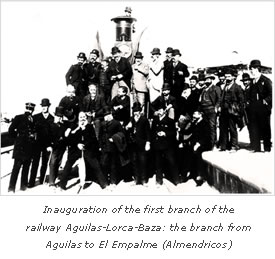 The inauguration of the Aguilas to Almendricos (Junction) branch.
The inauguration of the Aguilas to Almendricos (Junction) branch.
In December 1889, the Company issued a statement which set the official date of opening of the line from Aguilas to El Empalme for February 9, 1890.
On January 7 1890 the British steamship Cumbrian arrived at Aguilas harbour from Grimsby and unloaded the first shipment of the awaited passenger coaches: 1 first class carriage, 5 second class carriages, and 11 third class carriages, also all the stationery for invoicing. During the first days of February the two locomotives, which had already been assembled by the engineer Thomas Haslam, were tested and the cars and wagons which would serve the line were exhibited.
On March 24 1890 it was an historic day for the town of Aguilas: the Aguilas to El Empalme (Almendricos) branch was inaugurated.
Among the main characters at the event who appeared in the symbolic photograph were:
Jean Louis Lecoq Smith, Luis Benítez de la Cámara, Jorge Loring Heredia, Bartolomé Ródenas Rosas, Neil Kennedy, Pelayo Clairac Sáenz, Juan Santamaría del Pozo, José Novaes, Julio Leonés, Jorge Higgin Winfield, Eduardo Argenti Schülz, Aquiles Tardieu, Ricardo Puyol, Sezary, Manuel López de la Ferreira, Jorge Bulmer, Cayetano Gálvez, Samuel Agnew, Jorge Loring Oyárzabal, Demetrio Castro, Enrique Helguero de Bertodano, Jules Tardieu Albony, Robert Charles Ogilvie.
Besides those listed who appear in the photo, the following people also attended:
Archibald Napier, Gustave Gillman, Thomas Haslam, Carlos Clementson
And the following people probably also attended:
Carlos de Bertodano Pattison y Carlos Williams Du Ranteau
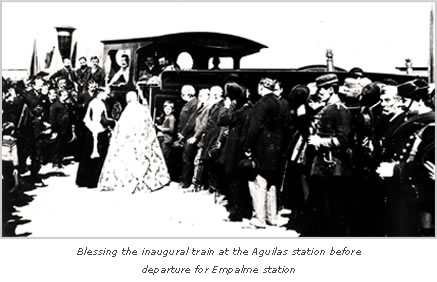
Once the problem was solved, in February 1891 Torrens as Managing Director of The Great Southern of Spain Railway Company Limited and accompanied by the new partners Jean Louis Lecoq and David Cooper Scott returned to inspect the work carried out on the line, in order to make a valuation of the work done before giving account at the hearing that would be held in London.
Then Kennedy who had been was designated director of the railway line which was open for operation and lived in Aguilas with his wife and children resigned in December 1891.
Immediately a new director of the railway company in Águilas was appointed, the engineer Henry Atwell Purdon, who until then had been in charge of the section under construction between Gor and Baza, which had been brought to a standstill by the Marquis of Loring.
That same month December 1891, Henry Atwell Purdon and the Marquis of Loring travelled to London in the company of Jorge Higgin, to try to provide a definitive solution to the question. These agreements would later be ratified in Madrid by Silvela and Montero-Ríos, but after that,Montero-Ríos was substituted by Juan de la Cierva as general lawyer of the Company.
 The political and social pressure to finish the section from Baza to Granada finally caused The Spanish Railways Trust & Investment Co. Ltd. to reach an agreement on April 2 1895 with The Granada Railway Co. Ltd. to complete this stretch.
In May 1895, Purdon received power of attorney from the company for the land expropriation where the railway line would pass on the way to Granada. On May 4 1896 the section of the railway from Aguilas station to the harbour was inaugurated.
On January 14 1897, Purdon’s wife Effice Gertrude Mary Purdon passed away at the age of 36, which probably hastened his resignation, he being replaced by Gustave Gillman Bovet, another engineer who had recently joined the railway company, having lived in Aguilas for some years and who was also a mining expert. Gillman would face an important challenge, to make a profit from the section already opened for commercial exploitation, completing it with the execution of the project for construction of an iron ore pier originally planned by Sykes Hett.
The definitive resolution of the British judicial court did not arrive until November 1894.
Meanwhile, the project of construction of the Hornillo Pier would be left for later, a new subsidiary company, The Hornillo Company Limited, would be formed. This company would review Hett’s original project designed by Juan Berné and would put Livesey and Co. Ltd in charge of its revision and update . The new and final project would be presented to the Ministry of Public Works under the signature of the engineers Jose Maria Blanco and Gustavo Gillman in April 1901.
The Hornillo pier
The conflict between Sykes Hett and the Marquis of Loring caused the departure of Sykes Hett from the consortium of companies on August 16 1890, the Great Southern Railway of Spain Co Ltd. remaining at the head of the railway and pier project.
In 1891 the project for construction of a mineral pier at El Hornillo was presented to the Civil Governor of Murcia. The project was approved on April 7 1891.
On September 18 1892 the Gaceta de Madrid published the definitive concession to The Great Southern of Spain Railway Company Limited.

However The Great Southern of Spain Railway Company Limited was too busy trying to finish the work on the railway track to Granada to address the construction of the pier. That is why there was a move in London to create a subsidiary company which would undertake the project completely.
Finally, on July 28 1899, The Hornillo Company Limited was registered in London and the Royal order of December 5 1899 reported that this company was the new concessionaire of the project of a pier in the Hornillo bay.
Equal shareholders in this new company were:
 Thomas William Bischoff, London EC, solicitor Thomas William Bischoff, London EC, solicitor
 Edward Griggs, Paddington, London W, gentleman Edward Griggs, Paddington, London W, gentleman
 Charles Dorchester Edwards, Muswell Hill, Londres, esquire Charles Dorchester Edwards, Muswell Hill, Londres, esquire
 John Hubert Williams Baly, Walton on Thames, gentleman John Hubert Williams Baly, Walton on Thames, gentleman |
 George Edwards Hunter Tell, London, solicitor George Edwards Hunter Tell, London, solicitor
 Henry Walton Burnside, Acton, Londres, gentleman Henry Walton Burnside, Acton, Londres, gentleman
 Thomas Bolter, Crouch End, London, gentleman Thomas Bolter, Crouch End, London, gentleman |
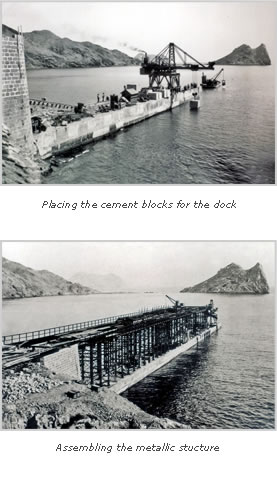
The Royal order of December 5 1899, informed that The Hornillo Company Limited was the new concessionaire of the project of the pier in El Hornillo bay.
The final revision and modification of the project was made by Livesey, Henderson Co. Ltd, which apparently entrusted the construction to a Dutch company.
In this way the engineers Jose Blanco and Gustavo Gilllman would be the authors of the update of the old project.
The esplanade of the railway station was used to build the cement blocks, which with the aid of a steam crane were placed one on top of another to assemble what would constitute the dock or part of the pier.
Once concrete jetty was finished, the metallic structure was assembled, for which the engineer David Buttle, the company’s head of material and traction, was responsible. Charles Daniel Ashwin Roff was another British engineer involved in the construction of the pier.
The Governor of Murcia signed a surveillance minute of the works on May 3 1903, enforcing their completion by January 30 1904.
In June the pier was completely finished, although it was not inaugurated officially until the arrival of the first ship. The inauguration took place on August 18 1903 with the loading of 4,000 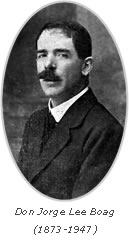 tons of iron ore onto the British ship Gwetland.
The easy and fast system of loading offered by the Hornillo pier meant that from 1905 the amount of iron ore from the Bacares and Serón mines was considerably increased, but the lack of rolling stock became evident. In addition, Gillman was overwhelmed by being in charge of the operation of both the pier and the railway. For this reason, in 1907 the Company sent him a man experienced in iron ore loading, George Lee Boag, who was appointed assistant manager of the company. Boag had experience of working for the Lancashire & Yorkshire Railway and continued it on the Transandine Railway in Argentina and later in Lagos, West Africa.
Finally Gustavo Gillman left his post three years later in 1911 and moved to other mining and railway operations in South America (particularly in Brazil).
What a mining spirit had this British engineer!
Ambrose P.S. Jones replaced Gillman as general manager for a couple of years until 1913 when Boag was appointed general manager of the company. Popularly known as Don Jorge, Boag would remain at the head office of the company almost thirty years, resigning his position shortly before the outbreak of the Spanish Civil War.
In 1913 the board of directors of the company comprised:
 Thomas Harrison, Orchewood, Gerrads Cross, Buckinghamshire Thomas Harrison, Orchewood, Gerrads Cross, Buckinghamshire
 Frank Henderson, Queen Ann Mansions, SW, Londres Frank Henderson, Queen Ann Mansions, SW, Londres |
 Charles Woodbyne Parish, 58, Ennismore Gardens, SW, Londres Charles Woodbyne Parish, 58, Ennismore Gardens, SW, Londres |
Thomas Harrison was chairman of the GSSR from 1906.
In 1907 the City Council allowed Enrique Helguero de Bertodano, still director of the Compañía del Puerto de Aguilas, to place in the Martillo a conveyor belt driven by a motor of the Tangye model, the only way to alleviate the competition which came with the opening of the Hornillo Pier. This loading system would not only increase the labour problems of the port’s dock workers, especially bitter in 1912, but would also cause important disadvantages, annoyances and illness to the population, permeating the whole village with ore dust.
This problem was repeated in the 1970s and 1980s with the loading of plaster and cement at the harbour with modern conveyor belts.
Between August 18 1903 and April 23 1936 about 2,548 ships were loaded at the Hornillo Pier with ore from the Sierra de los Filabres. The two main companies which shared this revolutionary system of transport and ore loading were The Bacares Iron Ore Mines Ltd. through the Society Cabarga San Miguel, which loaded the ore at Los Blancos station, situated between the stations of Serón and Tíjola (Almería) and the Dutch Company Wm H. Müller, through the Society Minas del Tesorero, which loaded at the Tíjola station (Almería).
Boards of directors of The Great Southern of Spain Railway Company Limited in London (1885-1941)
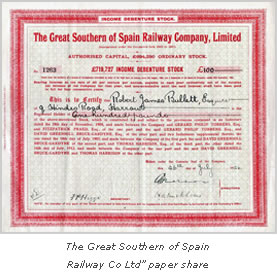  Gerard Philip Torrens Gerard Philip Torrens, ingeniero civil
 William Reierson Arbuthnot William Reierson Arbuthnot, director de banco
 Maurice Levyson Maurice Levyson, gentleman (fallecido en 1901)
 William McKerrow William McKerrow, comerciante
 Fitzpatrick Praed Fitzpatrick Praed, secretario de la Sociedad
 Edward Woods Edward Woods, ingeniero civil
 Thomas Harrison Thomas Harrison, director General
 Edmund Batten Forbes Edmund Batten Forbes, ingeniero civil
 Gustave Gillman Gustave Gillman, ingeniero civil
 Henry Andrew Micklem Henry Andrew Micklem, comandante
 Richard Popkiss Richard Popkiss, ingeniero civil
 Ronald Henry White Henderson Ronald Henry White Henderson, capitán
 Charles Hunter Pearson Charles Hunter Pearson
 Frank Percy Higgs Frank Percy Higgs
Until now, no direct action has been taken to slow down the damage of the pier.
The Hornillo pier and the branch line to Aguilas station have suffered major damage not only due to the passage of time but also to the presence of the facilities of a fish farm company; most recently there has been the partial destruction of the parterre access to the bridge on the Rambla de las Culebras. However, recent municipal action has built a pedestrian walk that embellishes and facilitates a visit to this area.
 Aguilas and its British residents Aguilas and its British residents
The increase of the trade in esparto and ores which was developed at the two natural harbours of Águilas, one in the West and one in the East, from the second half of the 19th century, meant that different countries with economic interests in the zone, mainly France and the United Kingdom, would establish their consular offices throughout all the coast of the South and Southeast of Spain.
Consular Agencies
The first cities that hosted vice-consulates in the south of Spain were Málaga (William Penrose Mark, appointed on January 1 1823), Almería (William Barron, appointed on September 22 1823), Granada (William Mark) and Adra (John Kirkpatrick, appointed on May 25 1825).
The main function of the vice-consulate was to defend the interests of his country in his area or zone of influence, solving any economic or diplomatic conflict that might arise for the British companies established there.
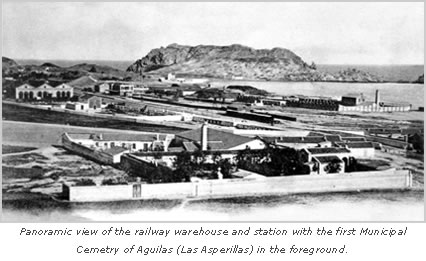 In Águilas, no few fights were defended already in 1868 by Angel Cervetto Belda, first British vice-consul of Aguilas (nominee in 1834 and confirmed for Real order in 1843), delicate situations that probably had influence in his relay and in the designation a year after (1869) of a new British vice-consul in Aguilas, William Milvain Davidson, who will be suceeded by Thomas Hilary Naftel in 1874, the last British vice-consul, until his death in 1936.
One of the first matters that the vice-consulates had to manage with the local, ecclesiastical and provincial authorities was the establishment of British or Protestant cemeteries.
The Religious Freedom Law, introduced in the Constitution 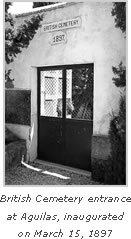 in 1879 and the Civil Cemeteries Law in 1871, finally made itpossible that the vice-consulates could arrange and obtain the appropriate permission for the opening of the first Protestant cemeteries in Spain, but not without thedistrust of the Catholic community. These first ones were in Tarragona, Málaga, Cadiz and Coruña.
The Protestant cemetery of Cartagena was built and managed by popular subscription, it being the British consul, Charles Washingham Turner, who asked the city council of Cartagena for the plot in February 1845.
The British Cemetery of Águilas was inaugurated on March 15 1897, the year following the inauguration of the new municipal cemetery.
Some remains of British citizens, who had been buried in the previous cemetery of Asperillas, were also transferred to the new graveyard. In the same way as at other British cemeteries, the one in Águilas served as a graveyard for people of other nationalities who were Protestant or at least non-Catholic.
British Consulate Registry
One of the main sources of information about the British who lived in Águilas came from the consular papers, particularly the registers of births and deaths. In the case of Águilas, these books are the only written testimony of the British colony established in our town.
Neither Angel Cervetto who from 1843 was the first British consular agent in Águilas, nor his successor, William Milvain, kept record books or censuses of the British colony established here at that time.
The Civil Registry, then under the municipal Court, did not include the deaths or births of foreigners in its registers until 1886. It was in August 1874 that the third and last British consul in Águilas, Thomas Hilary Naftel, started the register of deaths and in June 1875 the births. These are the only registers of the British colony in Águilas that have been found so far.
From the Register of Births of the Águilas vice-consulate we can extract the following important and interesting information, completed with new updated information:
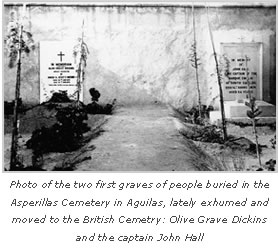 The marriage of Owen Dickins (esparto agent and ore merchant) and Jessy E. Barnett, had four children, Olive Grace Dickins, Muriel Jessy Dickins, Charles Sydney Dickins and Violette Maud Blanche Dickins.
The marriage of Owen Dickins (esparto agent and ore merchant) and Jessy E. Barnett, had four children, Olive Grace Dickins, Muriel Jessy Dickins, Charles Sydney Dickins and Violette Maud Blanche Dickins.
The two eldest girls died a few days or months after their birth, as we see in the Register of Deaths. Also, the eldest, Olive Grace Dickins, had the sad honour of being the second person to be buried in the British Cemetery, on June 29 1875. The first burial (August 15 1874) was that of Captain John Hall aged 63. The two gravestones are shown in the historical photograph taken by the great photographer from Lorca, José Rodrigo. - One of the first mining engineers who arrived in Águilas was the Irishman James J. Tonkin, who was born in Skibbereen (Cork) in 1849. He was the son of the miner William Tonkin (also from Skibbereen) and Margaret Morris. He married the aguileña Ramona Giménez who became Ramona Tonkin, the couple had a boy named Manuel Polonio was born on February 9 1877. Tonkin moved his residence to Huelva to work in the Rio Tinto mines, where he was director of the Foundry La Tortilla. He lived there until his death.
- Another of the first British families to arrive in Águilas was that of the esparto merchant George McFarlane and Margaret Anne Stewart, who lived in the Playa del Bol where Malcolm Stewart was born on March 28 1880.
- Another British marriage was that of the esparto agent Thomas Hilary Naftel (Sheppard), from Guernsey (Channel
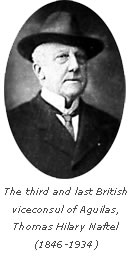 Islands) and Kate Ellen Barnett (Kembal), from London. They arrived in Águilas in 1874, when he was appointed by John Gray for the MacMurray Company. On May 23 1874 Naftel was appointed British vice-consul, the post in which he stayed until his death. After him there was no other British vice-consul in Águilas. Islands) and Kate Ellen Barnett (Kembal), from London. They arrived in Águilas in 1874, when he was appointed by John Gray for the MacMurray Company. On May 23 1874 Naftel was appointed British vice-consul, the post in which he stayed until his death. After him there was no other British vice-consul in Águilas.
The couple had four children, the first two being Arthur Rivoire, Roland Francis, Mervyn Rivoire, and Maurice. Later, Enid May was born. At that time the family had moved to 14 Calle de Aranda where a second daughter, Doris Naftel, was born.
The British vice-consul was widowed on January 20 1928 when his wife Kate died of chronic nephritis at the age of 70. His son-in-law, Robert Wilton Brown, attested to this at the civil registry. Brown was a merchant from Edinburgh, married to May Naftel.The vice-consul Thomas Hilary Naftel passed away in Águilas on January 29 1934.
- Also notable was the marriage between the merchant and mining agent James Glover, who was born in Enfield in 1839, and Angeles Belda Cuervo, from Águilas, where she was born in 1858. They were without a doubt the most prolific British family of all, they had eight children.
- Another marriage was that of the important esparto merchant Alexander Malcolm and Gertrude Butterfield. Malcolm was Scottish but was born in 1850 at Kenmore, Wandsworth-common; and Gertrude was from Camberwell, born on September 1 1881.
The couple lived in Playa del Bol and had three children. The first was a girl, Leslie Gordon, who was born in July 1882 but died 13 months later. The next children were both boys. The first they called him Geoffrey Johnston; and the second was named Claude Stanley. The family changed their address to the Casa de la Huerta after the birth of their first son.
On November 9 1888, Alexander Malcolm together with the shipping agent James Bernard Heywood, founded the company Malcolm & Heywood in Cartagena, this company was dedicated to the purchase, sale and shipment of esparto. The family finally took up residence in Lorca and Malcolm’s business relationship and friendship with his fellow Scot John Watson Gray helped to give a major boost to the esparto trade in Águilas during the last third of the 19th century and the beginning of the 20th.
-
George Finning (Mortimore), another esparto merchant, was born in Crediton, Exeter (Devonshire) was married to Mary Jane Nicholls Puckey, born in Liskeard (Cornwall), and the couple lived at first at the Playa del Bol.
Before arriving in Águilas, George Finning had had five children, of whom the first three (Elise, Elise Jane and Lucy) had died, George and Celestina Flora being still alive. In Águilas, another daughter was born who they named Annie, then two boys, Robert John) and the Philip Leonard.
On October 17 1888, Mary Jane died as a result of asthma. Thomas Frederick Hosking, merchant, born at Saint Blazey, England and resident in the delegation of Cope and Juan Lloret Gregori, commercial agent, born and living in Águilas, testified to her death at the civil registry.
Some years later, George Finning married the Spaniard Otilia Garea Mandía, from La Coruña. George and Otilia moved to Asperillas quarter where they became the parents of a daughter named Alice Finning Garea and of a son named Alexander Finning Garea.
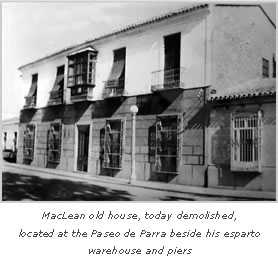 Norman MacLean (MacColl) was born in Glasgow on March 5 1860. He was the son of Daniel MacLean (from Stornoway) and Ann MacColl (from Appin). Norman MacLean arrived in Águilas in 1876.
Norman MacLean (MacColl) was born in Glasgow on March 5 1860. He was the son of Daniel MacLean (from Stornoway) and Ann MacColl (from Appin). Norman MacLean arrived in Águilas in 1876.
Later, he married Jessie Stephens (Lecte) from Birkenhead, where she was born on January 31 1869. Her parents were William Stephens and Anne Mary Lecte, both from Liverpool. MacLean started working as a commercial agent for the important esparto company M de J. Levy & Sons on March 14 1894.
On August 23 1893 the couple had their first son, Allan Cameron, in Águilas. Allan grew up in Águilas and played in the football team which was formed and trained by John Gray and George L. Boag. When World War I broke out, he joined the Australian army as a volunteer. He died at the front on April 25 1915, when he was 21 years old, and he sadly became the only aguileño-británico who died in the Great War.
Norman and Jessie were also the parents of Marjorie and Mercedes who was to die at the age of two and a half.
In 1898, a girl named Sheila was born and in 1900, Kenneth Stephens was born. In 1904, another boy, Fitzroy Donald was born. In 1907 Colin was born, and the youngest, Hugh, was born some time later.
Norman MacLean died on October 24 1925 due to general sclerosis, he was 71 years old.
The Evangelical Church of Águilas was founded by the Swede Carlos Haglund in 1893, being established in Jovellanos Street.
A couple of years after, the first British clergyman had settled in Águilas.
- The Scot Robert Pollock Simpson, born in Glasgow, was married to Ana Carolina Junod Baum, from Barenth (Bavaria). She was known as Doña Lina Simpson, whose self-sacrificing work of charity and medical care for the poor left a deep impression in our town.
The couple had in 1898 their first daughter, Ana Junod Simpson Baum, who died when she was 8 months old. She was buried at the recently opened British cemetery. Their second daughter arrived in 1899 and they named her Frida Baum Simpson; the third was born in 1904 and she was named Lina Julia Jeka Simpson. In 1911 their fourth daughter was born, Gerda Lina Marguerite Simpson.
With the arrival of the British mining and railway company agents, there was an increase in the number of British citizens in Águilas. 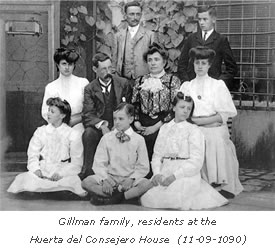
- Perhaps the best known of all would be the civil engineer Gustavo Gillman Bovet, born in London on June 15 1856, and his wife Maria del Rosario (Sirvent) Berganza, born on October 3 1858. The couple arrived in Águilas, more precisely at Cuesta de Gos, around 1885, although later they lived in Granada and Lorca, due to Gustavo’s jobs as a mining engineer and later as an engineer hired by the railway company, before settling down permanently in Águilas.
- Another married couple was the one composed of Thomas Andrew Haslam (Morris), who was Irish, a broker and employee of the railway, born in Arcide (Dublin) and Mary Ann Grant, who was born in Belfast.
Haslam came from Argentina, where he worked as station master at Fraile Muerto (Belle Ville, Córdoba) as a bulletin reported in 1876. There the Haslams had a daughter, Isabel Maud Mary, who was baptized in 1876 in the Anglican church. Like other British railway employees in Argentina, they moved to Águilas.
The Haslams lived first in Calle del Sol, where a boy named Marion Grant Haslam died on December 20 1888, he was born in Liverpool in June 1884. Shortly after, Thomas and Mary Ann moved to Calle Murillo where another boy, Thomas Charles Skeffington, was born on November 1, 1889.
The couple left Águilas at the end of 1889 to return to Argentina. There a son was born, named Enric Pleurice Haslam, who was baptized in Santa Trinidad, Lomas de Zamora on October 22 1893.
The Haslams’ son Thomas Charles Skeffington studied engineering in London, where he became a member of the Institute of Civil Engineers. Between 1910 and 1929 he worked for the Buenos Aires & Pacific Railway company and between 1929 and 1934 he was general manager of the La Guaira & Caracas Railway (Venezuela).
However, the most interesting part of this history is that a sister of Thomas Andrew Haslam was the grandmother of the important Argentine writer Jorge Luis Borges.
- Another married couple of mixed nationality was the clerk and attorney of the railway company Charles Clementson Beck, born in Calcutta and married to Soledad Palma Rico, born in Madrid. They arrived in Águilas from Cartagena around 1889.
- Another popular civil engineer who lived in Águilas, employed by the railway company, was Richard Popkiss (Gilbert), born in London in 1857, son of Richard Popkiss and Elise Gilbert. He was married to Eliza Jane Cowie (Milroy), born in Scotland in 1847, daughter of James Cowie and Mary Milroy. They lived at Calle del Reloj where, on May 31 1893, they became the parents of Dolores Milroy Popkiss Cowie.
At the end of the 19th century other British families arrived in Águilas.
- One of them was the family formed by the engineer Thomas Pool (Mortimer), a machinist, born in Tipton in 1848, son of Thomas Pool and Elisabeth Mortimer, was married for the second time to Silvestra Urquizo Gómez, born in Carcamo (Álava) in 1864, daughter of Fermin Urquizo and Gregoria Gómez. They established their home in the Asperillas, district of El Campo, and on January 22 1891, they had a daughter, Isabel Pool Urquizo. On April 15 1892 a son, Fermin Pool Urquizo, was born. Thomas had at least two children of his previous marriage, William and Henry, who lived in Águilas with him, since there are minutes of March 14 and on April 12 1893, respectively, by which he granted permission for them to get married.
- Frederick Augustus O'Brien was born in Poona (India) in 1860, son of a railway employee in that British colony. He was married in Bombay in 1886 to Alice Harriet Boileau. There they had their three first children. Around 1890 they moved to the United Kingdom, where O'Brien was employed by a railway company in Leicester.
In 1892 they travelled to Spain, where they made their home at Águilas station. There their daughter, Frances Edith Eileen, was born on July 28 1893.
O'Brien worked in Águilas for the railway company on the difficult task of solving the problems that the locomotives had with the hardness and salinity of the water. Around 1900 the family returned to the United Kingdom, settling in Kent. O'Brien continued working for the railway and died in Darlington in 1934, his wife died in 1949.
- The Englishman of Spanish origin, Jose Vinent, was clerk of the railway company and was married to the Englishwoman Maria Homedes. They lived in Calle del Sol and on August 5 1893 they had a son named Alberto.
- The mechanical engineer and head of the rolling stock department of the railway company, David Carlton Buttle (Fleming) and his wife Louisa Adelaide Wall (Young) arrived in Águilas around 1893. David Buttle was born in Inverness in 1866, son of John Buttle of Lancaster and Elisabeth Fleming of Stanley. Louise Buttle was from London and was born in 1873, daughter of Joseph Wall of Bexhill, architect, and Louisa Young, They established their home at Cuesta del Sol. Buttle was hired by the railway company as head of traction and was the person in charge of the assembly of the metallic structure at the Hornillo Pier. On February 1 1897, the Buttles had their first son, Robert. Later they had two daughters, the first, Mabel Adelaide, on January 8 1899 and the second, Elsie, on February 26 1902.
Around 1905, once the Hornillo Pier was opened, Buttle left the company and moved to Chile with his family.
- A Spaniard with British naturalisation, who worked as a clerk of the railway company, Natalio Olivero Ferrer, was married to Amalia Ramona Quintana Navarro, and they lived at 10 Calle Quintana. They registered their daughter, who was born on January 30 1903, with the name of Ana Catalina Natalia Ramona Amalia Angela Dolores Victoria. Olivero left the railway company in 1909 to become an archivist for the Águilas city council, although he continued playing as a goalkeeper in the legendary Águilas football team.
- Also living in Águilas was the engineer Thomas Hely Ayres, married to Luisa Matilda Wetherell, who lived in Cuesta del Sol. This couple had two children, Doreen Owen (born on September 16 1905 in Finsbury Park, London) and Cicely Florence (born on May 13 1907 in East Grinstead, Surrey). That year the family moved to Águilas, attracted by their sister and brother-in-law Sidney Ogilvie Browne and Cicely Newton Wetherell, who where living in this village.
Here, on September 6 1908, the Ayres’ only son, Luisón Francisco, was born. The family lived in Águilas for about 10 years, moving to the United States during the Great War. The family settled down in Brooklyn, where Thomas Hely worked as a marine engineer. There also died his only aguileño son, Luisón, who passed away on March 16 1919.
-
The mechanical engineer Frederick Jamieson, who was married to Josephine Mary Brydie, lived at Paseo de Parra, where, on February 24 1909, a son, Andrew, was born and on May 28 1911, another boy, Neil Mackie, was born.
-
The last entry made in the Register of Births was the one from the family of the engineer and Head of Traction of the Railway Company, Sydney Ogilvie Browne, who was married to Cicely Newton Wetherell, and lived at Huerta de Ruano.
On March 5 1911, this couple had a son named Gilbert Ernest (although we know that later they would have a daughter, Cicely Gwendoline). This railway engineer was known in Águilas by the nickname don Juan Browne, especially as regards the Explorers, of whom he was one of the most esteemed members of the Board of directors.
The British vice-consul in Águilas, Thomas Hilary Naftel, announced on May 23 1912, on the last page of the register, a new Registry Book of Births, which is probably lost.
British Consulate Registry of Deaths
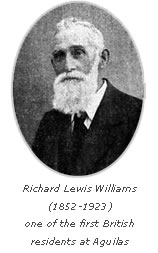
From the Registry of Deaths of the vice-consulate of Águilas we also have the following interesting information.
The first thing that calls our attention is the significant number of registrations of children, unfortunately very frequent at a time when infant mortality was very high. The poor quality of potable water and the sewage disposal systems, as well as the absence of resources and vaccines to prevent infections, caused more than one cholera epidemic.
In many cases it was the British who formed part of the Municipal Health Board and local commissions to contribute to economic aid with their own resources to tackle these epidemics which had such terrible consequences among the population. It is fair to remember the generosity which caused many of them to make donations or to organise acts of charity for the establishment of a health service or for the construction of the Hospital of Charity, today forgotten or despised.
- In 1875 died the 5 day old girl Olive Grace Dickins.
- In 1877 died the 9 month old girl Muriel Jessy Dickins.
- In 1879 died the 10 month old girl Mildred Jessie McFarlane.
- In 1883 died: the 5 day old boy Arthur Rivoire Naftel, the 10 months old boy James William Glover and the 13 month old girl Leslie Gordon Malcolm.
- In 1884 died the 4 year old girl Emma Glover.
- In 1885 died the 9 month old boy Percival Gillman.
- In 1886 died the 12 year old girl Hannah Isabella Patterson.
- In 1888 died: Mrs. Mary Jane Finning, 39 years old, the three and a half year old boy Marion Haslam Grant and the 6 month old boy Philip Leonard Finning.
- In 1890 died the 9 year old girl Agustina Carmen Clementson.
- In 1893 died the 1 year and 9 months old boy Maurice Naftel and the 6 months and 11 days old girl Maria de la Soledad Clementson.
- In 1895 died the 2 year old girl María del Rosario Clementson.
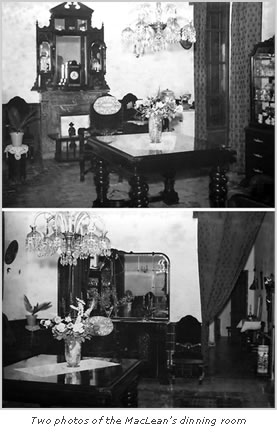
- In 1897 died Mrs. Effie Gertrude Mary Purdon died aged 36, married to the General Manager of the Lorca to Baza Railway Company, Henry Atwell Purdon, James William Gunter and Mrs. Ascensión Lewis.
- In 1898 died the 8 month old girl Anna Junod Simpson, and the 2 and a half year old girl Mercedes MacLean.
- In 1899 died Mrs. Anna Carolina Simpson.
- In 1905 died the 1 year old girl Lina Julia Jeka Simpson, who was the daughter of the missionary Robert Pollock Simpson.
- In 1909 died at the age of 72 Mrs. Julie Armstrong, who was married to the missionary Legh Bardgett Armstrong. The missionary, born in Liverpool, had arrived in Águilas from Barcelona, where he had married Julie (who was born in Switzerland, maiden name Bugnion) on February 13 1874.
- In 1910 died the 78 years old missionary Legh Bardgett Armstrong (MacNaughton).
- In 1911 died Mrs. Ana Ferrer Homedes.
Other interesting information comes from the register of British sailors whose lives ended in or on the sea at Águilas.
- In 1874, the 63 year old captain John Hall, died in the Bay of Aguilas, on board his ship Emilia of South Shields, record number 6317, according to the certificate signed by Doctor J. Ochoa, medical officer of the Health Service.
- In 1885, William E. Jackson aged 54, second officer of the steamer Crindau, record number 86357, drowned when he fell from a boat in the Port of Mazarrón, according to the certificate signed by the British vice-consul in Mazarrón, Ed. G. Pear.
- In 1893, the 42 year old merchant marine George Pennick, and the 22 year old mechanical engineer Benjamin George Bell accidentally drowned while the British ship Marcia, registry number 70611 of London, was berthed in the port of Águilas,. The latter apparently died in the Fonda Isabel, according to testimony in both cases of B. Morris, present at the time of the deaths.
From the civil registry the following complementary information is extracted:
- George Pennick was born in Flushing and was married to Elena Pennick, from Brightlingsea.
- In 1904, the 40 year old sailor Edward Wight, captain of the boat Hopedale, moored at the Hornillo pier.
- In 1905, the 60 year old man, William Knowles, pilot of the SS Cape Comino, of Newcastle, moored in the port of Águilas.
From the civil registry we know that the following also died:
- James Tokell, 39 years old, who was born in Jarrow (England), fireman of the English steamer F.D. Lambert. He died on June 26 1912 of a cerebral seizure.
- Edward James Renowden, 58 years old, born in Swansea, enginer of the Greek steamer Ystros. He was married in 1873 to Emma Mary Aston. He died on March 17 1913 in the hospital from traumatic pneumonia.
- Septimus P.R. Watson, 33 years old, born in Penarthglow, engineer of the British steamer Gilwen Manor. He was the son of James Watson and Elisabeth Boag and was single. He drowned in the sea on May 22 1923. There is a report of the post mortem performed by order of the Águilas harbourmaster.
- The record book of the British Cemetery does not register some names of the vice-consulate, probably because they had adopted Spanish nationality or the Catholic religion. But it includes other names that would be registered in a second book of the Vice-consulate, the copy of which is lost.
- Finally the following deaths were entered in the civil register, strangely they were not included either in the registers of the Vice-consulate or in those of the British Cemetery:
- Benjamin George Bell died on October 17 1894, at the age of 22, drowned in the sea as a result of the sinking of the boat Aurora.
- Brígida (Biddie) Cripps died on August 23 1933 at the age of 44 from intestinal occlusion and general poisoning. She was born in England and was the daughter of Edward Wight and Maria. She was married to Major Carlos W. Cripps, DSO, and they lived with their two daughters, Patrocinio and Diana, in the district of El Campo.
Municipal register of foreigners
The City council of Águilas used not to include foreign citizens in the different censuses of inhabitants, because the residence was accidental or because they did not know for how long they would be in the town. But in 1917 the City council opened a register for foreigners in which they included concise information of those foreigners who had habitual residence in Águilas, specifying the date of the entry, their full name, their nationality, profession and address, as well as details of the date and the consular office that issued their passport and whether they were habitual residents or temporary. Thus the British colony of Águilas was registered for the first time.
In 1917:
 Roberto Pollock Simpson, missionary, Paseo de Sánchez Fortún, resident Roberto Pollock Simpson, missionary, Paseo de Sánchez Fortún, resident
 Doris Naftel Doris Naftel
 Jessie MacLean Jessie MacLean
 Mary Eugenia Gray Mary Eugenia Gray
 Hugo Packenham Borthwick, Borthwick, landowner, Cope (Fraile Island) Hugo Packenham Borthwick, Borthwick, landowner, Cope (Fraile Island)
 Sidney Ogilvie Browne, Head of traction, railway, Paseo Rey Carlos III Sidney Ogilvie Browne, Head of traction, railway, Paseo Rey Carlos III
 Cecily Gwendoline Ogilvie Browne, Calle Lotería Cecily Gwendoline Ogilvie Browne, Calle Lotería
 Percileon Winston Churchill, Civil Engineer, Calle Joaquín Costa Percileon Winston Churchill, Civil Engineer, Calle Joaquín Costa
 Emily Churchill Emily Churchill
 George Heuch Winston Churchill, student, Paseo de Parra, resident George Heuch Winston Churchill, student, Paseo de Parra, resident
 Thomas Blázquez, Shipping agent, Calle Floridablanca Thomas Blázquez, Shipping agent, Calle Floridablanca
 Susana Kennedy Simpson Susana Kennedy Simpson
 Ricardo Lewis y Williams, propietario, Calle Libertad Ricardo Lewis y Williams, propietario, Calle Libertad
 Alicia Violeta Glover, Calle Rey Carlos III Alicia Violeta Glover, Calle Rey Carlos III |
 Enid May Naftel, housewife, Calle Lope Gisbert Street Enid May Naftel, housewife, Calle Lope Gisbert Street
 Norman Maclean, comerciante, Paseo de Parra Norman Maclean, comerciante, Paseo de Parra
 John Gray, merchant, Paseo de Parra John Gray, merchant, Paseo de Parra
 Robert Graham, merchant, El Bol Robert Graham, merchant, El Bol
 George Lee Boag, railway general manager, Estación George Lee Boag, railway general manager, Estación
 Cecily Newton Browne, (sometimes registered as Cecily Newton Wetherell) Cecily Newton Browne, (sometimes registered as Cecily Newton Wetherell)
 Eugenie Jane Churchill(sometimes registered as Elfrida Eugenie Churchill) Eugenie Jane Churchill(sometimes registered as Elfrida Eugenie Churchill)
 Louis Charles Lowenthal, Accountant of railway, Paseo de Parra Louis Charles Lowenthal, Accountant of railway, Paseo de Parra
 Thomas Hilary Naftel, Sheppard, British vicecónsul, Calle Lope Gisbert Thomas Hilary Naftel, Sheppard, British vicecónsul, Calle Lope Gisbert
 Elena Gillman Sirvent, Huerta (sometimes registered as Elena Norberta Gillman) Elena Gillman Sirvent, Huerta (sometimes registered as Elena Norberta Gillman)
 Evelina María Glover, Calle Rey Carlos III Evelina María Glover, Calle Rey Carlos III |
In 1919 are added:
 Robert Bonham Smith, Head of Traffic, railway company Robert Bonham Smith, Head of Traffic, railway company
 Thomas Carlson Thomson, (clerk), Calle Quintana Thomas Carlson Thomson, (clerk), Calle Quintana
 Ernesto Gilbert Boag, student, temporary residence Ernesto Gilbert Boag, student, temporary residence
|
 Ruby Bonham Smith Ruby Bonham Smith
 Peggy Edith Thompson Peggy Edith Thompson
 Robert Kynock Wilton Brown Robert Kynock Wilton Brown |
 Ambrosio Enrique Rafael Cooper Ambrosio Enrique Rafael Cooper, fonda Comercio (probably the father of Carew Martin Ashley Cooper, Head of traction for the railway company)

In 1924 is added Miss Lidyl Mary King, secretary, with British passport issued in Ireland.
In 1925, se añade en la entrada de los Churchill a Aida Emily Churchill, junto a Elfrida y Emily, todas ellas estudiantes. Y Elspeth Maclean en la familia Maclean.
También en est
, in the Churchill family the entry for Aida Emily Churchill is added, together with Elfrida and Emily, all of them students. Elspeth Maclean is added to the Maclean family.
Also in this year there appears an entry for a missionary called Guillermo Carlos Castle and his wife Grace May Hollands, both with passports issued in Vigo and both living at Calle Sanchez Fortún. Thomas Blázquez (Procónsul) and Soledad Blázquez are shown with Raimundo Blázquez Larrea, both with the address of 2 Calle Castelar.
In 1926 Mrs. Margaret Christina Havoken appears.
In 1927 Grace May Castle appears, also Beatrice Bowolon Marshal and Annie Rose Dodd, both living in the Port. Gilbert Race, a merchant who lived at the Calle Arenal, appears for the first time.
In 1928 the brother and sister, Gilbert Ernest and Ufreda Eugenie Churchill appear for the first time Very important is the entry for Violet Ada Torrens, of Gérard Philip Torrens’ family, who lived at La Huerta, with a passport issued in Singapore. Also appearing for the first time is the entry for Mary Houchen, living in the Port and with a passport issued in New Zealand. Also appearing are entries for a mother and daughter from New Zealand, Ethel Stanley Pyne and Muriel Colin Pyne.
In 1929 there is a considerable reduction of the British colony. The permanent residents were the Boag, Browne, Race, Churchill and Lowenthal families. In 1930 Margaret Christina Havoken is again registered, and Charles Edward Willson, a sailor, who lived in the Calle Becerra, appears for the first time.
In 1931 the Lowenthals are already registered as a married couple and there are three interesting entries: 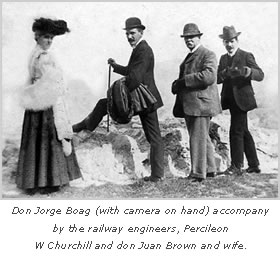 Enrique Barker Enrique Barker, a student, who lived at Calle de Romero, with a passport issued at Liverpool, Federico Barker, a merchant, resident at Calle Pablo Iglesias and Eleanor Boag, appearing as a resident of Calle del Aire.
The new entries made in 1932 are interesting. Besides Gilbert Race, employee, appears Margaret Christina Havoken Race, both with their address at Calle Pablo Iglesias. The student Enrique Barker still appears with an address in Calle Quintana. Also very important, Charles William Cripps, major, is registered on March 3 1932, together with Nellie Cripps, both living in Paseo Hernández.
Shortly after, on April 23 1932, V. M. Cripps, T.E.G. Cripps, A.D.G S. Bevington and P.S. Bevington appear, all of them women and living at El Cocón. The same year the evangelical priest R.J. Barnés also appears, as a resident in Calle Aranda. Federico Barker continues to appear as a permanent resident, now with the profession of merchant, also Rupert Arnold Brabuer, both living in Calle Quintana. That year, Violet M. Cripps is shown as a resident at El Rubial, but the T.E.G. Cripps and the Bevingtons still appear registered at El Cocón.
In 1934 the priest R. J. Barnés is again registered with his wife, Mary Penelope Barnés. Also registered on February 6 is Geraldine Mary Bagshaw, niece of George Lee Boag.
In 1935 the merchant Enrique Barker appears with Dorotea Miura Vanghou, both as residents of calle García Hernandez. Three people appear for the first time: the engineer John William, also a resident in calle García Hernández; Richard Ernest Barker, a merchant and a resident of calle Pablo Iglesias; and Susan Margaret Houchen, with an address at the harbour. The engineer John William appears again, but adding a second surname, Creese, together with his wife Marjorie Creese, both with British passport issued in Baghdad.
In 1936, the Boags, the Lowenthals and the Brownes, among others, still appear registered as permanent residents. This year the sisters Maria and Berta Gillman are registered, also the missionary Romualdo Juan Barnés, as a resident of Calle Aranda.
In 1937 and 1938 the only resident registered was Maria Luisa Ceilel Guiraud de Borbonet, who lived at García Hernández Street.
In 1939, when the Spanish Civil War finished, there are only the Lowenthals and the Gillman sisters registered, also their brother Juan Roberto Gillman, who was appointed as the manager of the Lorca, Baza and Águilas Railway Company after the resignation of George Lee Boag.
The last registrations are entered in 1941, but already no British people figure among them.
Other names appear registered, although they were Spaniards are:
 Mónico Martínez García, Calle del Aire Mónico Martínez García, Calle del Aire
 Milagros Buck Campoy Milagros Buck Campoy |
 Joaquín Buck García, day labourer Joaquín Buck García, day labourer |
Another British-Spanish family who lived in Aguilas were Raimundo Blazquez Orozco, born in Águilas (1862-1909) and his wife Elspeth MacEwen Birch, from Edinburgh (1869-1926). In 1881 Raimundo bought the old foundry Virgen del Pilar to be converted in a esparto warehouse. When he died, the warehouse was bought by Juan Gray, his employee.
The couple lived in Calle Castelar and they had 12 children, none of whom were registered by the British vice-consulate: Raimundo, Antonio, Augustina, Angel, Carmen, Ana, Angela, Tomás, Berni, Grace, Raimundo and Andres. Although the first six children all died young, Raimundo, Tomas and Angel continued the esparto trade.
Raimundo worked as partner of Oscar Perrau, a Belgian businessman resident in Águilas, and the second was a shipping agent.
Elspeth Blázquez MacEwen married the lecturer and scientist William Ogilvie Kermack in Scotland where they lived and died.
Elspeth Blázquez MacEwen married in 1925 the lecturer and scientist William Ogilvy Kermack, who was born in Kirriemuir, Angus, Scotland, where they lived and death. William Ogilvy Kermack was the son of a postman, who was graduated in chemistry in Aberrdeen University, working in biochemistry research in Oxford, Edinburgh and finally Aberdeen, where he passed away in 1970 in his residence at Marschal College.
|
|





